#los angeles screenplay contest
Explore tagged Tumblr posts
Text
Reunion
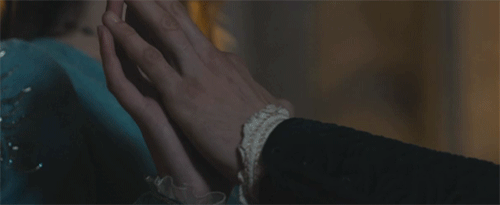
The Writing Contest - Chapter 4: Reunion
Summary: The premiere night of the movie based on Nora and Javi's screenplay changes everything and nothing at the same time.
Pairing: Javi Gutierrez x Female!OC (Nora Delaine)
Rating: 18+ Series
Word Count: 3,100(ish)
Warnings: Romance (we're laying it on thick today), angst, longing
Author’s Note: Nora's got issues to work through if that's not apparent. Also this is where Nora's love for Bon Jovi (and mine) starts becoming part of the story, not just the chapter titles.
xxx
"Do I look okay?"
Sierra gawked at you through the video chat on your phone, which you had prompted against the mirror in your hotel room's bathroom. "Do you look okay? Seriously, Nora? You look like a princess."
You were dressed in a sleek turquoise blue dress with silver embroidery along the shoulders and edges, your shoulders almost completely exposed and your breasts just contained enough. You had minimum make up on but what you did have on, especially your black eye liner, highlighted your facial features. Your light brown hair was pinned into an updo that had taken you nearly two hours to complete, to your dismay, but at least it looked like the pictures you'd found online. There was a pearl necklace, earrings, and silver rings on three of your fingers that rounded out your look, along with the delicate white sandals with two inch heels that Sierra could not see due to the bathroom countertop being in the way.
"That sounds like too much," you said, frowning. Maybe you should've gone with a black dress.
"No! No!" Sierra shouted, moving closer to her phone's camera. "It's perfect! You look amazing. Everyone at the premiere won't know what hit them."
You blushed, uncertain if you wanted to draw that kind of attention to you. You just wanted to fit in that night, when you joined a selected chosen few to watch California Dreamers for the first time in a classy theater in Los Angeles before its worldwide release the week after.
It was surreal, how your story would soon be on the big screens, for all who wished to see it. Your excitement over it had your hands shaking.
"So are you nervous?" Sierra inquired.
"Of course I am," you replied, taking a final look at your face in the mirror. "I've never been to an event like this. Walter said some paparazzi might take pictures of me. If I do anything wrong I might just end up on the cover of some gossip magazine under 'New Screenplay Writer Has Big Oops At Premiere' or something."
"Don't make me jealous," Sierra said, grinning. "And that's not what I meant. I was talking about how you're about to see Javi again for the first time in a year."
"Why would I be nervous about that?" you asked. "We've kept in contact. I told you that filming for his latest screenplay is starting next month. He knows I've sold another one too. And we did use video chat a few times."
"Yes, but talking through the computer or phone once a month is not the same as in person," Sierra pointed out. "And you still have unresolved feelings for him."
"I do not," you protested a little too fast.
She gave you the look. The one that read as seriously? "You haven't even tried to put yourself out there at all the past year, Nora. Don't deny it."
You tried to anyway. "I've been busy with the second screenplay, you know that. It's been stressful writing completely solo for the first time and then trying to sell it on my own after."
She sighed. "Whatever, why do I even bother? Forget I brought it up and enjoy yourself tonight, Nora. You deserve it."
"Thanks."
"You'd better hang up with me," she figured, glancing at the ancient clock hanging on her kitchen wall. "By the time you call a taxi and they drive you there it'll almost be seven."
You said your goodbyes and switched to calling out for a taxi, the nearest company promising a car within fifteen minutes. It was on time, and you quickly made your way from the inside of your hotel lobby to the car. Though the driver did a double take of you (the good kind) he was nothing but polite and opened the back door for you.
On the ride to the movie theater you twirled the rings on your fingers, jitters truly setting in for the first time, and not just because of the film.
Even though you had denied it, Sierra was right, of course. You still had feelings for Javi and you'd been distracting yourself by burying yourself in your work, not just your second screenplay, but also the part time pet sitting business you'd started, a means to an end to making rent, though you did enjoy taking care of your clients' animals. It wasn't too serious though. You didn't have a regular client base and could leave whenever you liked, something you'd needed to be able to come to the premiere and any other future ones. You hoped someday to quit once you made enough money writing.
The theater the film was premiering at appeared after a right turn onto a busy business street and you ran a hand over the front of your dress, smoothing out wrinkles that didn't exist.
"Showtime," you uttered quietly and carefully stepped out of the taxi after paying the driver, making sure to include a healthy tip.
The entrance to the red carpet section beyond a border of ropes was being guarded by a burly man who was at least a foot taller than you, and seeing him caused your anxiety to flare. You had remembered your pass, right?
You fumbled with your wallet and pulled it out, raising it to your eye level like some detective on an eighties cop show.
"Nora Delaine," he noted, voice booming. "First time at a premiere?"
"How can you tell?" you asked, trying not to squeak.
He smiled, and it was friendly enough, but you were still intimated. You were pretty sure his biceps were larger than your head.
"You look more nervous than my mother's Chihuahua," he chuckled.
And I'm proportionally the same size, you thought.
You sucked in a deep breath and put yourself together. You were being ridiculous. A lot of people in Hollywood were above average height and buff, especially when compared to the average in your town. People of French heritage weren't actually typically all that short, but your family and neighbors did fit the stereotype.
"Have you seen Javi Gutierrez yet?"
"Right here," a familiar voice beyond the ropes answered.
You swiveled your head in the direction of the owner of it and your breath caught.
Several yards away Javi was standing by a backdrop wall put up so the paps could take photos of people as they arrived. He was as handsome as ever, dressed in a classic black and white suit and dress shoes.
Video chat really didn't do him justice, especially when he dressed up.
You approached him after picking your jaw up off the floor, beaming. "Javi!"
"Nora." He opened himself up to you for a hug and you accepted the offer, head against his chest and hands on his shoulder blades. You realized as his hands fell on your spine that you'd forgotten how warm and comforting he was, and you probably lingered in his embrace longer than a friend typically would because of it.
When you pulled away you blinked up at him, analyzing his appearance. Something was different about him.
You gaped at him when you figured it out. "You cut your hair!"
"I always do for premieres," he stated, "For the photos."
You felt a wave of sorrow over the loss of his curls, which was silly, especially since he apparently grew his hair out whenever he wasn't in Hollywood for business, but the feeling was still there.
"You look great, Javi," you told him honestly, "But you also looked great with your waves."
"Thanks," he said, with a hint of a blush on his cheeks. "I'll keep that in mind."
He guided you at the waist towards the center of the carpet as the paparazzi were allowed to file in line along the ropes and started snapping photos of the people that had arrived before you.
You didn't recognize anyone but the director, Marion Young. The actors were probably going to be last to show up, for dramatics.
"Javi look here!" someone called out and you and Javi both pivoted towards a young petite blonde with a massive camera in her hands. You wondered how she could even lift the thing.
"Time to pose," Javi said and you did exactly that as the girl started snapping photos of you together, side by side.
After what felt like ages, you relaxed the forced smile on your face and moved on down the line with him.
"You famous around these parts, Javi?" you inquired, knowing that paps didn't normally recognize writers like that.
"I've been caught hanging out with Nic a few times lately," he explained.
"Ah."
Duh. One of the easiest ways to get noticed in Hollywood was being in the vicinity of a famous actor. Of course someone who was close friends with Nic Cage would gain attention.
"I'm surprised they're not telling me to back out of the shot," you said as another pap's camera flashed at you.
"Even if they did not know you were the main contributing writer to this movie," Javi started, "You look stunning in that dress, cariño. They're eating you up."
Cariño. That was new. You were pretty sure that translated to something like sweetheart. Which wasn't necessarily a romantic pet name but... "Javi." His name came out of you like a warning.
"This is exactly why I made the contest," he told you as you both gained more and more attention nearing the front door of the building. One of his arms was still curled around you. "I wanted to give someone else a shot at the limelight. Soak it in while you can. Hollywood moves fast."
You nodded, not sure what to say, having decided to pretend to have missed the new pet name and ignore how much he was touching you. You didn't want to make a big deal out of it. He tended to get that way when he was excited. That was all it was.
He released you once inside the building and you also had to push aside the disappointment you felt from the loss of contact, shoving the emotion down to replace it with the excitement bubbling up in you for what you'd come here for.
It was time to watch the movie.
You sat down beside him at the back of the theater where the people who weren't the actors and director were asked to sit, and waited anxiously to see the final result of the hard work everyone in the room (besides the few civilians chosen to watch with them) had put in.
It felt like everything was about to change.
x
"So, how'd you like the movie?" Javi questioned as you settled down in the backseat of his limo with him a couple hours later.
"I loved it!" you exclaimed. "The director didn't change too many details and the cinematography was gorgeous. I admit, I wasn't thrilled at first with the casting, they definitely hired the actors for their popularity rather than their appearances fitting Nolan and Angie, but I can't really fault the casting people for it. Those two acted their asses off." You hummed as something that had bothered you crossed your mind. "I do wish the love scene would've been more them though."
Javi glanced at you quizzically. "What do you mean?"
"I'm not against movies having music in the background of a love scene," you informed him, "Not in the slightest. They usually add to it. But Nolan turning on that stereo? So not him. He wouldn't want to drown out his partner, you know? They were alone, no one to hear them. It was unnecessary and made it less intimate. Don't you think so?"
He cleared his throat. "Ah, sí, definitely." His phone binged with a text and he nearly jumped in his seat. You tried not to notice though it wasn't like him to get awkward discussing a love scene. You had wrote two together for Angie and Nolan, and they had been pretty spicy. Javi had been completely professional about it.
"Who's that?" you asked.
"One of the producers," he replied as he read the text. "Just reminding everyone the after party is only for those who were part of the crew or wrote for the movie and their significant others. No other family."
"They're paying for the booze," you guessed.
He grinned. "Sí. They promised a round of free shots."
"I think I'll stick to wine tonight," you told him. "The hangover after my birthday celebration was not worth it."
Javi chuckled. "I think I will refuse the offer too. I need to use every spare hour I have tomorrow editing my latest script. I cannot jeopardize my ability to meet the deadline to submit it to the film company interested in it."
The limo driver parked the vehicle and you and Javi quickly exited.
"What are the odds on them having chosen Club Midnight for the party?" you quizzed as you both strolled inside the familiar building.
"High," he shouted at you over the loud music. "I chose to bring you and Sierra here because I've been here many times for after parties. They rent out. So there won't be any general public tonight."
You nodded and weaved your way through the crowd to the bar, with Javi trailing you.
"Hey, congratulations," an unfamiliar woman said as you passed. "How do you feel, your first screenplay being a hit with the critics? Did you see the review calling the movie a beautifully real story about a man and a woman facing life's trials together?"
You turned your head in her direction and flashed her a toothy grin. "Thank you. I hadn't actually checked the reviews yet. Didn't know they released them so fast. And I figured the real test is going to be with the general audiences next week."
"True," she agreed. "They're the ones that make sure your scripts keep getting interest. Still, critical reviews affect turnout to some degree. Don't write off them off."
"Never."
You made it to the bar and ordered the first red wine you could think of, and Javi did the same. You both planted yourselves on bar stools in the corner of the room, away from most of the commotion, after the bartender handed you your drinks.
"I have a confession," you admitted to Javi as you tasted your wine.
"Do tell," he said, leaning in towards you.
"I still like cocktails more than wine."
Javi barked out a laugh. "I won't hold it against you."
"Promise?"
"Promise."
You scanned the club, taking in your surroundings and watching as a decent crowd danced the night away on the center floor.
Being there again made it feel like the weekend of your thirty-fifth birthday had been yesterday. It was hard to believe more than a year had passed. A year, and here you were, in the club with Javi again.
What was the saying? The more things change, the more they remain the same? Was that appropriate for this situation?
An hour passed. You and Javi made small talk between yourselves and spent a little time mingling, chatting with the director and complimenting the actors for a job well done. You even talked to a few of the camera crew members for a bit before the DJ put on some slow music for couples to dance to.
You lit up when you recognized the beginnings of the second song. "You Want To Make A Memory."
"What?" Javi frowned.
"The song," you explained, "It's one of my favorites. Do you know Bon Jovi?"
"I saw them in concert once, in Spain, when I was twenty-one," Javi answered. "My girlfriend at the time suggested we go. They were good."
"Aren't they?" You grinned. "They're my favorite band. Jon has such a good voice and I like the majority of their songs."
"Oh?" Javi stood from the couch you were both seated on and offered you a hand in a very prince-like manner. "Do you want to dance?"
You widened your eyes. "Oh, no, you don't have to."
"Come on," he encouraged. "It'll be fun."
"Okay..."
You grabbed his hand and followed him onto the dance floor, where your eyes met and time seemed to slow. He smiled at you and clasped your right hand and his left together. You smiled back and put your left hand on his shoulder. Then his right hand found the small of your back and you both started swaying to the soothing beat of the song.
You soon realized you couldn't look away from Javi and it seemed he couldn't look away from you either. You were trapped, spellbound together, mesmerized, completely lost in the moment. Your heart was racing for no damn reason except the intensity of his gaze.
This wasn't supposed to happen. Moments like this, they were only in the movies, were they not? Yet there you were, living it, and too lost in it for your fears to touch you.
Your face got closer and closer to Javi's, seemingly on its own accord, and he also leaned in towards you, the hand on your back wandering up to rest along your jaw.
Then he was kissing you, and you were kissing him back, both pouring your longing into the movements of your lips, softly, sweetly.
It was exactly the same kind of kiss Nolan and Angie had shared in your screenplay after they'd decided they wanted to be together, no matter what other people thought about their relationship.
You abruptly pushed yourself away from Javi at that thought, the spell broken, and shook your head.
"I can't do this, Javi," you told him, your heart feeling like it was in a vice grip.
"Why not?' he inquired, caressing your face, eyes soft. It hurt, how affectionate he was being with you.
"Because in the morning I'll fly back home," you stated. "Nothing that happens between now and then could change that."
Javi dropped his hand, looking crestfallen, and you backed away, feeling guilty but knowing that trying to comfort him wouldn't help the situation. You couldn't be his friend after what had just happened. Your only real option was to turn away and leave.
So that's what you did. You practically fled the club, eyes welling up like they had after you'd said goodbye to him at the airport.
You cried because you knew the truth. It wasn't actually distance that was the problem, or even the differences between you and Javi.
It was you.
You and your cowardice.
You wanted to be brave, you wanted to charge back into that club and tell him you'd stay to see where your relationship went, but the fearful part of you, the one that remembered your history and the lessons your family had taught you, prevented you from doing so.
Better a broken heart now than a crushed one later.
xxx
Tagged: @harriedandharassed
xxx
Link to Bon Jovi's Song (on youtube)
(This song vibes with this chapter, imo)
xxx
Series Masterlist
Main Masterlist
xxx
#Javi Gutierrez#The Unbearable Weight Of Massive Talent#Javi G Fanfic (Mine)#OC Fanfic#The Writing Contest Series
9 notes
·
View notes
Text
Crossroads (2002)

I don’t often go to Karaoke, but when I do, at least one of Britney Spears’ songs plays. She may have retired, but she’s still got fans. Her 2002 movie Crossroads? Not so much – most likely because even those who saw it in theaters have forgotten it. How could you not when the story is comprised entirely of overused ideas and every attempt to say something serious leaves the screen as quickly as possible?
Ten years ago, Lucy (Britney Spears), Kit (Zoe Saldana) and Mimi (Taryn Manning) made a promise to stay best friends. Unfortunately, growing up has broken them up. Kit is the most popular girl in school, Lucy is an introverted valedictorian whose father (Dan Aykroyd) is pushing towards becoming a doctor and Mimi doesn’t seem to have any future after becoming pregnant and then breaking up with her boyfriend. When the girls nonetheless open the memory box they swore to open on graduation night, they decide to rekindle their friendship with a trip to Los Angeles. How will they get there? By getting the enigmatic bad boy Ben (Anson Mount) to drive them.
Let me dig deeper into these characters and I’ll bet you'll figure out the movie’s biggest problem. Stuck-up Kit is engaged to Dylan, who proposed before leaving to study at UCLA. They haven’t seen each other in months so the trip is her opportunity to surprise him with a visit. Mimi wants to go to Los Angeles and enter a singing contest. If she wins, the prize money is her ticket to freedom. What’s going on with her pregnancy? We’ll get to that in a bit. Lucy has some minor musical inspirations but singing doesn’t fit in the bright future her father has planned for her. He’s very possessive of Lucy since her mother (Kim Cattrall) left them 16 years ago. As for Ben, he’s a musician who just recently got out of jail and there are rumors it was because he killed someone.

Let me spell out the clichés for you. Kit’s fiancé, Dylan? He’s cheating on her. That’s why he hasn’t been visiting. Ben? He’s no murderer. He was jailed but it was because he stood up to his abusive stepfather. Lucy’s mom? She doesn’t want anything to do with her daughter and has a whole new family. There’s a twist surrounding Mimi’s pregnancy. She wasn’t impregnated by the boyfriend she broke up with; she was raped after having too much to drink at a party. Who’s her baby's father? It’s Dylan. Don't worry, the film will have her miscarry before the end credits so the question of what she'll do with her baby is a non-issue. Kit now has two reasons to break up with her boyfriend. Poor Mimi isn’t only a victim; she’s got no chance in this movie because when she gets on stage, she turns into a mouse while Lucy has everyone cheering. The sexual assault means the movie has no reason to get Mimi back together with her boyfriend and while she’s technically single, there’s only one romantic prospect in Crossroads and he’s going to fall for Lucy. It only makes sense; he’s the musician and she’s the singer who doesn’t know she has what it takes to be a star.

I’m working my way to some compliments but first, I have to bring up another significant flaw in Crossroads. This movie was made for die-hard Britney Spears fans, which is to say teenage girls (and the boyfriends they’re dragging to the theater). As such, the film dips its toes into relevant/serious issues: teenage pregnancy, losing your virginity, finding your own way after graduation/growing up, broken familial bonds, friendships that fade over time, etc. The story by Spears (brought to life by Shonda Rhimes, who writes the screenplay) doesn’t address these matters. It gets worse the further along we get, with Mimi’s baby plot getting wrapped up so fast it’s insulting.
I don’t know whether to criticize or praise the film for trying to be more than a light-as-air musical road movie. By trying to be both, I don’t think it’ll leave many people satisfied… except maybe the aforementioned boyfriends forced to come along. There are a lot more shots of Britney Spears in lingerie than you’d expect.
So what’s good about this movie? Well, Spears. She’s not great (her accent slips in at least one scene) but I’m surprised she didn’t pursue acting further. She plays a teenager convincingly, particularly in the scenes where her character is emotionally vulnerable. She comes off as instantly likable and sweet. Crossroads doesn’t quite succeed with its dramatic ideas, but it occasionally hits the mark, particularly when it comes to Lucy’s plots and you have to praise its ambition. In the music department, the numbers are well-woven into the story and prove why Spears is one of the world's best-selling artists.
At best, Crossroads is “fine”. I can't give it any more than that, not with all those predictable storylines. It also isn’t memorable, except maybe in how shoddily it resolves the bulk of its stories. To its credit, I expected much worse. Thankfully, as far as popstar film vanity projects/vehicles go, this is no From Justin to Kelly. (October 9, 2024)

#Crossroads#movies#films#movie reviews#film reviews#Tamra Davis#Shonda Rhimes#Britney Spears#Anson Mount#Zoe Saldana#Taryn Manning#Kim Cattrall#Dan Aykroyd#2002 movies#2002 films
4 notes
·
View notes
Text
#FemaleFilmmakerFriday: Alanna Brown, Female Video Production Director
New Post has been published on https://ezraproductions.com/fmf-alanna-brown/
#FemaleFilmmakerFriday: Alanna Brown, Female Video Production Director
At Ezra Productions, we’re dedicated to amplifying the voices of talented diverse filmmakers, especially those who are telling stories of impact. In our Female Filmmaker Friday series, we’re thrilled to introduce the remarkable film director, Alanna Brown, who is breaking barriers in the video production industry in Los Angeles. Alanna’s festival award-winning directorial and screenwriting debut, TREES OF PEACE, was acquired by Netflix for global distribution in 2022. While she’s been staffed for TV and writes feature scripts on assignment, she continues writing her own spec screenplays and has two features in development, which she’s attached to direct. Alanna has been featured in the Black List, Hit List, and Young & Hungry List.
Alanna’s journey from actress to award-winning video director and screenwriter is nothing short of inspiring. Let’s delve into her experiences, insights, and the invaluable lessons she shares with aspiring filmmakers.
How and when did you decide to get into the world of video production?
As an actress in my 20’s, it was a scene study class that led me to writing and directing. We were taught to be proactive, to write and shoot shorts with ourselves cast in the lead roles. My first short film project instead became a vehicle for my writing and directing career! I’d always been drawn to storytelling since childhood, and films like The Shawshank Redemption and Jaws just totally compelled me. I felt like I had to be a part of this cinematic world and its magic. Once that acting class led me to the filmmaking discovery, I decided to go for it with my idea for TREES OF PEACE. That script then sort of broke me into the industry; it was a finalist in a big contest and got me an agent and manager pretty quickly. So now I had reps, which was cool, but they can only open so many doors… Getting the film made was a whole other endeavor.
I was greatly encouraged and inspired by a speech given by Ava Duvernay, in which she told aspiring filmmakers to “stop waiting for permission” and just make the piece you want to make. Source the money, find the crew, build the team on your own. So I jumped straight from my first short to my first feature film (which took another five years to get made). My love for writing and directing is something I could not tamp down even if I wanted to. It feels like a part of me, a force in and of itself—which has gotten me through many, many low points. I’m driven to tell stories I believe can touch people’s lives or say something about society, as well as by a desire for better representation on screen and behind the camera.
What video production project are you most proud of?
I’m incredibly proud of TREES OF PEACE and the team that helped bring it to life. For my first indie film to become a Netflix Original and be profitable was a big deal. I feel so fortunate. But I’m so proud, too, of my short film, which was such a labor of love and taught me a ton. I also made a proof of concept trailer for TREES OF PEACE on a shoestring budget in my friend’s garage and I look back on it with great pride. It’s still on Vimeo and was instrumental in helping me acquire financing for the feature. Every project is a vital stepping stone on the journey.
youtube
What is it like being a woman in the video production world?
There is, in my experience, still a stigma to being a female in this industry today but it is nowhere near where it was 15 years ago. In another 15 it will hopefully be a thing of the past–that this is still a field primarily dominated by men. But there is something to say on that as well: we need all people in this industry to share their diverse stories. That very much includes men, women, people of all shapes, sizes, colors and creeds.
I absolutely want to support other women in the industry – I recently went on Instagram Live with female cinematographer Emily Skye (@shewolffilms) to discuss with both of our followers ways to collaborate, including promoting each others work on your social platforms – it’s free and a great way to get female-made content further into the world.
What are your interests outside of filmmaking?
I’m big into meditation, exercise, hiking, and getting out into nature. Keeping a healthy mind and body is essential to career sustainability and belief in yourself (as well as a joyful life!). This is such a volatile industry, it can be painful at times. Remaining grounded is the lifeblood of emotional stability and the flow of inspiration. I also love to travel abroad and soak in other cultures and food!
What causes are you passionate about?
I’m passionate about equity in storytelling (and society at large), as stories are a window into the world for people who don’t get outside of their bubble. I’m passionate about body autonomy and human rights for all women. And I’m passionate about holistic, truthful education, as that’s also a key to a better more equitable world.
What it like being a black female in the video production world? Do you have any funny or horror stories to tell?
Being a Black female in the world in general is already tough. And I’m petite at only 5’1” tall, so I’m extra invisible. (That’s why Quinta Brunson is especially inspiring to me—super talented Black woman running an Emmy-winning show, and tiny!) I get a lot of OWA submissions for only Black content, which is fortunate because that’s what I want to put into the world. But it’s also unfortunate because I’m pigeon-holed, and white men never are. And that segues into judgement… I’ve taken meetings for TREES OF PEACE as well as a prison spec pilot I wrote where people were like—you wrote this?? You? Wrote all of this? Even the dialogue? It’s a bit…violent. I’m not sure if that’s about me being Black, a woman, or petite, or all of those things combined. But people tend to be surprised that my darker work has come 100% from my brain (and heart). For me, the takeaway is this: people do expect a person who creates a certain thing to look a certain way on the outside. But that’s just not how art works. It’s a shame because this confirms to me that there’s a preconceived notion around what Black women can and should create.
Business-wise, it’s also extremely tough being a Black woman. This is a white-male-dominant industry which makes it significantly harder for anyone “other” to break in. You see this at every level. Even looking now at the 2024 Oscar noms; like always, the categories are dominated by white males with your occasional woman or person or color. Why? Because voting Academy members are predominantly white males and the content that they find resonant or meaningful is what validates their lived experience.
How do you help other women and minorities succeed in the video production world?
I will almost always read a script or look at a deck and give notes, or respond with advice when asked, to help a fellow artist. My creative circle and the people off Instagram who reach out to me happen to be mostly people of color and/or women, I think because that’s the creative world I’ve immersed myself in. I also tried, with TREES, to interview and hire as many women-of-color HODs as possible.
Do you have any advice for other black women filmmakers?
My advice to Black women filmmakers is the same thing Ava said so many years that encouraged me on my path. Stop waiting for permission. The artistic community needs you to bring your vision to life.
For current female filmmakers, just keep doing what you are doing. We need your voice and your stories out there in the world. Get out there and shoot your story, make connections, network and support each other because that is the only way we will eventually create a new narrative.
As a woman-owned video production company based in Los Angeles, Ezra Productions takes pride in fostering creativity and championing diverse voices like Alanna’s. Through her unwavering dedication to storytelling and commitment to fostering inclusivity, she has not only carved a path for herself but also paved the way for others. We’re honored to highlight trailblazers like Alanna, whose passion and vision enrich the cinematic landscape and drive positive change.
If you’re looking for a social impact focused commercial video production company in Los Angeles or New York, contact us to get started on your project today.
0 notes
Text
Top 5 @Wikipedia pages from yesterday: Sunday, 10th December 2023
Welcome, dobrodošli, bonvenon, willkommen 🤗 What were the top pages visited on @Wikipedia (10th December 2023) 🏆🌟🔥?

1️⃣: Leave the World Behind (film) "Leave the World Behind is a 2023 American apocalyptic psychological thriller film produced, written and directed by Sam Esmail. It is based on the 2020 novel of the same name by Rumaan Alam. The film stars Julia Roberts, Mahershala Ali, Ethan Hawke, Myha'la, and Kevin Bacon as they attempt to make..."
2️⃣: Animal (2023 film) "Animal is a 2023 Indian Hindi-language action drama film directed and edited by Sandeep Reddy Vanga, who also co-wrote the screenplay with Pranay Reddy Vanga and Saurabh Gupta. The film is produced by Bhushan Kumar, Krishan Kumar, Murad Khetani and Pranay Reddy Vanga under T-Series Films, Bhadrakali..."
3️⃣: Shohei Ohtani "Shohei Ohtani (大谷 翔平, Ōtani Shōhei, born July 5, 1994), nicknamed "Shotime", is a Japanese professional baseball pitcher and designated hitter who is a free agent. He has played in Major League Baseball (MLB) for the Los Angeles Angels and for the Hokkaido Nippon-Ham Fighters of Nippon..."

Image licensed under CC BY-SA 2.0? by Mogami Kariya
4️⃣: Premier League "The Premier League is the highest level of the English football league system. Contested by 20 clubs, it operates on a system of promotion and relegation with the English Football League (EFL). Seasons typically run from August to May, with each team playing 38 matches against all other teams, both..."
5️⃣: Ryan O'Neal "Ryan O'Neal (April 20, 1941 – December 8, 2023) was an American actor. Born in Los Angeles, he trained as an amateur boxer before beginning a career in acting in 1960. In 1964, he landed the role of Rodney Harrington on the ABC nighttime soap opera Peyton Place. It was an instant hit and boosted..."
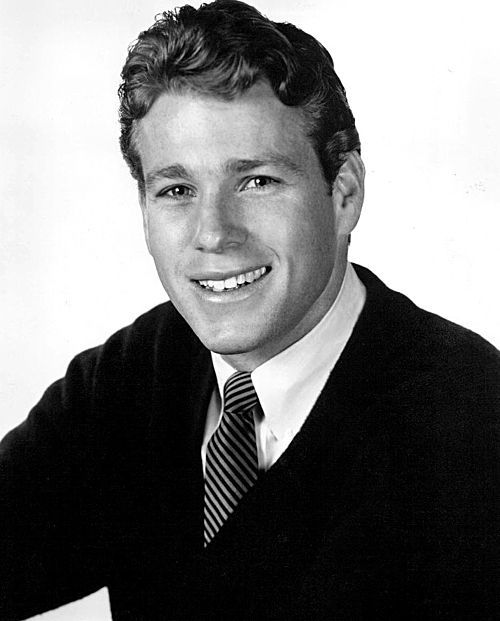
Image by Wire photo
0 notes
Text
DEATH RACE 2000 (1975) – Episode 185 – Decades Of Horror 1970s
“You know, it used to be in the old days, we would just take someone like you in an alley and blow their brains out.” While you eat lightning and crap thunder? Join your faithful Grue Crew – Doc Rotten, Chad Hunt, Bill Mulligan, and Jeff Mohr – as they take a ride-along with David Carradine and Sylvester Stallone in Roger Corman’s Death Race 2000 (1975). Vroom, vroom!
Decades of Horror 1970s Episode 185 – Death Race 2000 (1975)
Join the Crew on the Gruesome Magazine YouTube channel! Subscribe today! And click the alert to get notified of new content! https://youtube.com/gruesomemagazine
In a dystopian future, a cross-country automobile race requires contestants to run down innocent pedestrians to gain points that are tallied based on each kill’s brutality.
Director: Paul Bartel
Writers: Robert Thom (screenplay by), Charles B. Griffith (screenplay by), Ib Melchior (from his story: “The Racer”)
Producer: Roger Corman
2nd Unit Director: Lewis Teague, Charles B. Griffith,
Selected cast:
David Carradine as “Frankenstein”
Simone Griffeth as Annie Smith (Frankenstein’s navigator)
Sylvester Stallone as Joe “Machine Gun” Viterbo
Mary Woronov as Jane “Calamity Jane” Kelly
Roberta Collins as Matilda “The Hun”
Martin Kove as Ray “Nero the Hero” Lonagan
Louisa Moritz as Myra (Joe’s navigator)
Don Steele as Junior Bruce (race announcer)
Joyce Jameson as Grace Pander (race announcer)
Carle Bensen as Harold (race announcer)
Sandy McCallum as Mr. President
Paul L. Ehrmann as Special Agent (credited as Paul Laurence)
Harriet Medin as Thomasina Paine
Vince Trankina as Lieutenant Fury
Bill Morey as Deacon
Fred Grandy as Herman ‘The German’ Boch (Matilda’s navigator)
William Shephard as Pete (Jane’s navigator)
Leslie McRay as Cleopatra (Nero’s navigator)
Wendy Bartel as Laurie
John Favorite as Henry (credited as Jack Favorite)
Sandy Ignon as FBI Agent
John Landis as Mechanic
Darla McDonell as Rhonda Bainbridge
Roger Rook as Radio Operator
Dick Miller as a member of the Chicken Gang (uncredited)
Lewis Teague as a Toreador (uncredited)
Join the Grue-Crew as they revisit the campy sci-fi smash-em-up, Death Race 2000 (1975), from Roger Corman’s New World Pictures and director Paul Bartel. The film stars David Carradine (as Frankenstein) opposite pre-Rocky Sylvester Stallone (as Joe “Machine Gun” Viterbo) in the dystopian “future” of the year 2000, a time when Americans root for their favorite drivers as they race from New York to New Los Angeles mowing down civilians along the way for points. Machine Gun Viterbo is out for blood while Frankenstein has other plans. Let the shenanigans begin.
At the time of this writing, Death Race 2000 is available to stream from Tubi, Popcornflix, Cultpix, and PPV from Apple TV.
Gruesome Magazine’s Decades of Horror 1970s is part of the Decades of Horror two-week rotation with The Classic Era and the 1980s. In two weeks, the next episode, chosen by Bill, will be Sinbad and the Eye of the Tiger (1977), showcasing Ray Harryhausen’s genius, Jane Seymour, Patrick Troughton, and . . . Patrick Wayne? That should be interesting.
We want to hear from you – the coolest, grooviest fans: comment on the site or email the Decades of Horror 1970s podcast hosts at [email protected].
Check out this episode!
1 note
·
View note
Link
“Bill Labonia is part of a new breed of professionals who are linking creativity to commercial "tino". Although he is still unknown to the Brazilian public, he already has 19 international awards, obtained in just two (2) years as a professional screenwriter, at festivals in Berlin, Los Angeles, Texas, Cannes and Hollywood.“
Between his script writing guide O Guia Pratico do Roteiro de Cinema, the TV writing focused O Guia Pratico dos Roteiros de TV, VFS graduate Bill Labonia is a script doctor and editor guiding countless new and prospective writers and winning handfuls of awards along the way for his own creative works. He was awarded Best TV Drama at Cannes Screenplay Contest in 2016 with his script for Broken Family, the same script that placed second in the Los Angeles Screenplay Contest. He has worked on well over 100 scripts for clients and is quickly becoming a prolific force in the screenwriting world.
#vancouverfilmschool#vfs#writing#screenwriting#script doctor#script editor#cannes#los angeles screenplay contest#O Guia Pratico do Roteiro de Cinema#O Guia Pratico dos Roteiros de TV#brazil#bill labonia
0 notes
Link
“Bill Labonia is part of a new breed of professionals who are linking creativity to commercial “tino”. Although he is still unknown to the Brazilian public, he already has 19 international awards, obtained in just two (2) years as a professional screenwriter, at festivals in Berlin, Los Angeles, Texas, Cannes and Hollywood.“
Between his script writing guide O Guia Pratico do Roteiro de Cinema, the TV writing focused O Guia Pratico dos Roteiros de TV, VFS graduate Bill Labonia is a script doctor and editor guiding countless new and prospective writers and winning handfuls of awards along the way for his own creative works. He was awarded Best TV Drama at Cannes Screenplay Contest in 2016 with his script for Broken Family, the same script that placed second in the Los Angeles Screenplay Contest. He has worked on well over 100 scripts for clients and is quickly becoming a prolific force in the screenwriting world.
#vancouverfilmschool#vfs#writing#screenwriting#script doctor#script editor#cannes#los angeles screenplay contest#o guia pratico do roteiro de cinema#o guia pratico dos roteiros de tv#brazil#bill labonia
0 notes
Text
Hattie McDaniel
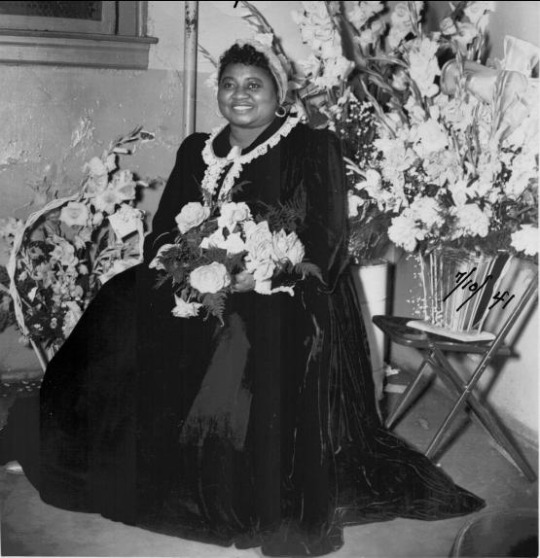
Hattie McDaniel (June 10, 1893 – October 26, 1952) was an American actress, singer-songwriter, and comedian. She won the Academy Award for Best Supporting Actress for her role as "Mammy” in Gone with the Wind (1939), becoming the first African American to win an Oscar.
In addition to acting in many films, McDaniel recorded 16 blues sides between 1926–1929 (10 were issued) and was a radio performer and television star; she was the first black woman to sing on radio in the United States. She appeared in over 300 films, although she received screen credits for only 83.
Encountering racism and racial segregation throughout her career, McDaniel was unable to attend the premiere of Gone with the Wind in Atlanta because it was held at a whites-only theater, and at the Oscars ceremony in Los Angeles she sat at a segregated table at the side of the room; the Ambassador Hotel where the ceremony was held was for whites only, but allowed McDaniel in as a favor. When she died in 1952, her final wish--to be buried in Hollywood Cemetery--was denied because the graveyard was restricted to whites only.
McDaniel has two stars on the Hollywood Walk of Fame in Hollywood: one at 6933 Hollywood Boulevard for her contributions to radio; and one at 1719 Vine Street for acting in motion pictures. She was inducted into the Black Filmmakers Hall of Fame in 1975, and in 2006 she became the first black Oscar winner honored with a U.S. postage stamp. In 2010, she was inducted into the Colorado Women's Hall of Fame.
McDaniel, the youngest of 13 children, was born in Denver in 1893 to formerly-enslaved parents in Wichita, Kansas. Her mother, Susan Holbert (1850–1920), was a singer of gospel music, and her father, Henry McDaniel (1845–1922), fought in the Civil War with the 122nd United States Colored Troops. In 1900, the family moved to Colorado, living first in Fort Collins and then in Denver, where Hattie attended Denver East High School (1908-1910) and in 1908 entered a contest sponsored by the Women’s Christian Temperance Union, reciting "Convict Joe", later claiming she had won first place. Her brother, Sam McDaniel (1886–1962), played the butler in the 1948 Three Stooges' short film Heavenly Daze. Her sister Etta McDaniel was also an actress.
McDaniel was a songwriter as well as a performer. She honed her songwriting skills while working with her brother Otis McDaniel's carnival company, a minstrel show. McDaniel and her sister Etta Goff launched an all-female minstrel show in 1914 called the McDaniel Sisters Company. After the death of her brother Otis in 1916, the troupe began to lose money, and Hattie did not get her next big break until 1920. From 1920 to 1925, she appeared with Professor George Morrison's Melody Hounds, a black touring ensemble. In the mid-1920s, she embarked on a radio career, singing with the Melody Hounds on station KOA in Denver. From 1926 to 1929, she recorded many of her songs for Okeh Records and Paramount Records in Chicago. McDaniel recorded seven sessions: one in the summer of 1926 on the rare Kansas City label Meritt; four sessions in Chicago for Okeh from late 1926 to late 1927 (of the 10 sides recorded, only four were issued), and two sessions in Chicago for Paramount in March 1929.
After the stock market crashed in 1929, McDaniel could only find work as a washroom attendant at Sam Pick's Club Madrid near Milwaukee. Despite the owner's reluctance to let her perform, she was eventually allowed to take the stage and soon became a regular performer.
In 1931, McDaniel moved to Los Angeles to join her brother Sam, and sisters Etta and Orlena. When she could not get film work, she took jobs as a maid or cook. Sam was working on a KNX radio program, The Optimistic Do-Nut Hour, and was able to get his sister a spot. She performed on radio as "Hi-Hat Hattie", a bossy maid who often "forgets her place". Her show became popular, but her salary was so low that she had to keep working as a maid. She made her first film appearance in The Golden West (1932), in which she played a maid. Her second appearance came in the highly successful Mae West film I'm No Angel (1933), in which she played one of the black maids with whom West camped it up backstage. She received several other uncredited film roles in the early 1930s, often singing in choruses. In 1934, McDaniel joined the Screen Actors Guild. She began to attract attention and landed larger film roles, which began to win her screen credits. Fox Film Corporation put her under contract to appear in The Little Colonel (1935), with Shirley Temple, Bill "Bojangles" Robinson and Lionel Barrymore.
Judge Priest (1934), directed by John Ford and starring Will Rogers, was the first film in which she played a major role. She had a leading part in the film and demonstrated her singing talent, including a duet with Rogers. McDaniel and Rogers became friends during filming. In 1935, McDaniel had prominent roles, as a slovenly maid in Alice Adams (RKO Pictures); a comic part as Jean Harlow's maid and traveling companion in China Seas (MGM) (McDaniels's first film with Clark Gable); and as the maid Isabella in Murder by Television, with Béla Lugosi. She appeared in the 1938 film Vivacious Lady, starring James Stewart and Ginger Rogers. McDaniel had a featured role as Queenie in the 1936 film Show Boat (Universal Pictures), starring Allan Jones and Irene Dunne, in which she sang a verse of Can't Help Lovin' Dat Man with Dunne, Helen Morgan, Paul Robeson, and a black chorus. She and Robeson sang "I Still Suits Me", written for the film by Kern and Hammerstein. After Show Boat, she had major roles in MGM's Saratoga (1937), starring Jean Harlow and Clark Gable; The Shopworn Angel (1938), with Margaret Sullavan; and The Mad Miss Manton (1938), starring Barbara Stanwyck and Henry Fonda. She had a minor role in the Carole Lombard–Frederic March film Nothing Sacred (1937), in which she played the wife of a shoeshine man (Troy Brown) masquerading as a sultan.
McDaniel was a friend of many of Hollywood's most popular stars, including Joan Crawford, Tallulah Bankhead, Bette Davis, Shirley Temple, Henry Fonda, Ronald Reagan, Olivia de Havilland, and Clark Gable. She starred with de Havilland and Gable in Gone with the Wind (1939). Around this time, she was criticized by members of the black community for the roles she accepted and for pursuing roles aggressively rather than rocking the Hollywood boat. For example, in The Little Colonel (1935), she played one of the black servants longing to return to the Old South, but her portrayal of Malena in RKO Pictures's Alice Adams angered white Southern audiences, because she stole several scenes from the film's white star, Katharine Hepburn. McDaniel ultimately became best known for playing a sassy, opinionated maid.
The competition to win the part of Mammy in Gone with the Wind was almost as fierce as that for Scarlett O'Hara. First Lady Eleanor Roosevelt wrote to film producer David O. Selznick to ask that her own maid, Elizabeth McDuffie, be given the part. McDaniel did not think she would be chosen because she had earned her reputation as a comic actress. One source claimed that Clark Gable recommended that the role be given to McDaniel; in any case, she went to her audition dressed in an authentic maid's uniform and won the part.
Upon hearing of the planned film adaptation, the National Association for the Advancement of Colored People (NAACP) fought hard to require the film's producer and director to delete racial epithets from the movie (in particular the offensive slur "nigger") and to alter scenes that might be incendiary and that, in their view, were historically inaccurate. Of particular concern was a scene from the novel in which black men attack Scarlett O'Hara, after which the Ku Klux Klan, with its long history of provoking terror on black communities, is presented as a savior. Throughout the South, black men were being lynched based upon false allegations they had harmed white women. That attack scene was altered, and some offensive language was modified, but another epithet, "darkie", remained in the film, and the film's message with respect to slavery remained essentially the same. Consistent with the book, the film's screenplay also referred to poor whites as "white trash", and it ascribed these words equally to characters black and white.
Loew's Grand Theater on Peachtree Street in Atlanta, Georgia was selected by the studio as the site for the Friday, December 15, 1939 premiere of Gone with the Wind. Studio head David O. Selznick asked that McDaniel be permitted to attend, but MGM advised him not to, because of Georgia's segregation laws. Clark Gable threatened to boycott the Atlanta premiere unless McDaniel were allowed to attend, but McDaniel convinced him to attend anyway.
Most of Atlanta's 300,000 citizens crowded the route of the seven-mile motorcade that carried the film's other stars and executives from the airport to the Georgian Terrace Hotel, where they stayed. While Jim Crow laws kept McDaniel from the Atlanta premiere, she did attend the film's Hollywood debut on December 28, 1939. Upon Selznick's insistence, her picture was also featured prominently in the program.
For her performance as the house slave who repeatedly scolds her owner's daughter, Scarlett O'Hara (Vivien Leigh), and scoffs at Rhett Butler (Clark Gable), McDaniel won the 1939 Academy Award for Best Supporting Actress, the first black actor to have been nominated and win an Oscar. "I loved Mammy," McDaniel said when speaking to the white press about the character. "I think I understood her because my own grandmother worked on a plantation not unlike Tara." Her role in Gone with the Wind had alarmed some whites in the South; there were complaints that in the film she had been too "familiar" with her white owners. At least one writer pointed out that McDaniel's character did not significantly depart from Mammy's persona in Margaret Mitchell's novel, and that in both the film and the book, the much younger Scarlett speaks to Mammy in ways that would be deemed inappropriate for a Southern teenager of that era to speak to a much older white person, and that neither the book nor the film hints of the existence of Mammy's own children (dead or alive), her own family (dead or alive), a real name, or her desires to have anything other than a life at Tara, serving on a slave plantation. Moreover, while Mammy scolds the younger Scarlett, she never crosses Mrs. O'Hara, the more senior white woman in the household. Some critics felt that McDaniel not only accepted the roles but also in her statements to the press acquiesced in Hollywood's stereotypes, providing fuel for critics of those who were fighting for black civil rights. Later, when McDaniel tried to take her "Mammy" character on a road show, black audiences did not prove receptive.
While many black people were happy over McDaniel's personal victory, they also viewed it as bittersweet. They believed Gone With the Wind celebrated the slave system and condemned the forces that destroyed it. For them, the unique accolade McDaniel had won suggested that only those who did not protest Hollywood's systemic use of racial stereotypes could find work and success there.
The Twelfth Academy Awards took place at the Coconut Grove Restaurant of the Ambassador Hotel in Los Angeles. It was preceded by a banquet in the same room. Louella Parsons, an American gossip columnist, wrote about Oscar night, February 29, 1940:
Hattie McDaniel earned that gold Oscar by her fine performance of 'Mammy' in Gone with the Wind. If you had seen her face when she walked up to the platform and took the gold trophy, you would have had the choke in your voice that all of us had when Hattie, hair trimmed with gardenias, face alight, and dress up to the queen's taste, accepted the honor in one of the finest speeches ever given on the Academy floor.
Academy of Motion Picture Arts and Sciences, fellow members of the motion picture industry and honored guests: This is one of the happiest moments of my life, and I want to thank each one of you who had a part in selecting me for one of their awards, for your kindness. It has made me feel very, very humble; and I shall always hold it as a beacon for anything that I may be able to do in the future. I sincerely hope I shall always be a credit to my race and to the motion picture industry. My heart is too full to tell you just how I feel, and may I say thank you and God bless you.
McDaniel received a plaque-style Oscar, approximately 5.5 inches by 6 inches, the type awarded to all Best Supporting Actors and Actresses at that time. She and her escort were required to sit at a segregated table for two at the far wall of the room; her white agent, William Meiklejohn, sat at the same table. The hotel had a strict no-blacks policy, but allowed McDaniel in as a favor. The discrimination continued after the award ceremony as well as her white co-stars went to a "no-blacks" club, where McDaniel was also denied entry. Another black woman did not win an Oscar again for 50 years, with Whoopi Goldberg winning Best Supporting Actress for her role in Ghost. Weeks prior to McDaniel winning her Oscar, there was even more controversy. David Selznick, the producer of Gone With the Wind, omitted the faces of all the black actors on the posters advertising the movie in the South. None of the black cast members were allowed to attend the premiere for the movie.
Gone with the Wind won eight Academy Awards. It was later named by the American Film Institute (AFI) as number four among the top 100 American films of all time in the 1998 ranking and number six in the 2007 ranking.
In the Warner Bros. film In This Our Life (1942), starring Bette Davis and directed by John Huston, McDaniel once again played a domestic, but one who confronts racial issues when her son, a law student, is wrongly accused of manslaughter. McDaniel was in the same studio's Thank Your Lucky Stars (1943), with Humphrey Bogart and Bette Davis. In its review of the film, Time wrote that McDaniel was comic relief in an otherwise "grim study," writing, "Hattie McDaniel, whose bubbling, blaring good humor more than redeems the roaring bad taste of a Harlem number called Ice Cold Katie". McDaniel continued to play maids during the war years for Warners in The Male Animal (1942) and United Artists' Since You Went Away (1944), but her feistiness was toned down to reflect the era's somber news. She also played the maid in Song of the South (1946) for Disney.
She made her last film appearances in Mickey (1948) and Family Honeymoon (1949), where that same year, she appeared on the live CBS television program The Ed Wynn Show. She remained active on radio and television in her final years, becoming the first black actor to star in her own radio show with the comedy series Beulah. She also starred in the television version of the show, replacing Ethel Waters after the first season. (Waters had apparently expressed concerns over stereotypes in the role.) Beulah was a hit, however, and earned McDaniel $2,000 per week; however, the show was controversial. In 1951, the United States Army ceased broadcasting Beulah in Asia because troops complained that the show perpetuated negative stereotypes of black men as shiftless and lazy and interfered with the ability of black troops to perform their mission. After filming a handful of episodes, however, McDaniel learned she had breast cancer. By the spring of 1952, she was too ill to work and was replaced by Louise Beavers.
As her fame grew, McDaniel faced growing criticism from some members of the black community. Groups such as the NAACP complained that Hollywood stereotypes not only restricted black actors to servant roles but often portrayed them as lazy, dim-witted, satisfied with lowly positions, or violent. In addition to addressing the studios, they called upon actors, and especially leading black actors, to pressure studios to offer more substantive roles and at least not pander to stereotypes. They also argued that these portrayals were unfair as well as inaccurate and that, coupled with segregation and other forms of discrimination, such stereotypes were making it difficult for all black people, not only actors, to overcome racism and succeed in the entertainment industry. Some attacked McDaniel for being an "Uncle Tom"—a person willing to advance personally by perpetuating racial stereotypes or being an agreeable agent of offensive racial restrictions. McDaniel characterized these challenges as class-based biases against domestics, a claim that white columnists seemed to accept. And she reportedly said, "Why should I complain about making $700 a week playing a maid? If I didn't, I'd be making $7 a week being one."
McDaniel may also have been criticized because, unlike many other black entertainers, she was not associated with civil rights protests and was largely absent from efforts to establish a commercial base for independent black films. She did not join the Negro Actors Guild of America until 1947, late in her career. McDaniel hired one of the few white agents who would represent black actors at the time, William Meiklejohn, to advance her career. Evidence suggests her avoidance of political controversy was deliberate. When columnist Hedda Hopper sent her Richard Nixon placards and asked McDaniel to distribute them, McDaniel declined, replying she had long ago decided to stay out of politics. "Beulah is everybody's friend," she said. Since she was earning a living honestly, she added, she should not be criticized for accepting such work as was offered. Her critics, especially Walter White of the NAACP, claimed that she and other actors who agreed to portray stereotypes were not a neutral force but rather willing agents of black oppression.
McDaniel and other black actresses and actors feared that their roles would evaporate if the NAACP and other Hollywood critics complained too loudly. She blamed these critics for hindering her career and sought the help of allies of doubtful reputation. After speaking with McDaniel, Hedda Hopper even claimed that McDaniel's career troubles were not the result of racism but had been caused by McDaniel's "own people".
In August 1950, McDaniel suffered a heart ailment and entered Temple Hospital in semi-critical condition. She was released in October to recuperate at home, and she was cited by United Press on January 3, 1951, as showing "slight improvement in her recovery from a mild stroke."
McDaniel died of breast cancer at age 59 on October 26, 1952, in the hospital on the grounds of the Motion Picture House in Woodland Hills, California. She was survived by her brother Sam McDaniel. Thousands of mourners turned out to celebrate her life and achievements. In her will, McDaniel wrote,
"I desire a white casket and a white shroud; white gardenias in my hair and in my hands, together with a white gardenia blanket and a pillow of red roses. I also wish to be buried in the Hollywood Cemetery".
Hollywood Cemetery, on Santa Monica Boulevard in Hollywood, is the resting place of movie stars such as Douglas Fairbanks and Rudolph Valentino. Its owner at the time, Jules Roth, refused to allow her to be buried there, because, at the time of McDaniel's death, the cemetery practiced racial segregation and would not accept the remains of black people for burial. Her second choice was Rosedale Cemetery (now known as Angelus-Rosedale Cemetery), where she lies today.
In 1999, Tyler Cassidy, the new owner of the Hollywood Cemetery (renamed the Hollywood Forever Cemetery), offered to have McDaniel re-interred there. Her family did not wish to disturb her remains and declined the offer. Instead, Hollywood Forever Cemetery built a large cenotaph on the lawn overlooking its lake. It is one of Hollywood's most popular tourist attractions.
McDaniel's last will and testament of December 1951 bequeathed her Oscar to Howard University, where she had been honored by the students with a luncheon after she had won her Oscar. At the time of her death, McDaniel would have had few options. Very few white institutions in that day preserved black history. Historically, black colleges had been where such artifacts were placed. Despite evidence McDaniel had earned an excellent income as an actress, her final estate was less than $10,000. The IRS claimed the estate owed more than $11,000 in taxes. In the end, the probate court ordered all of her property, including her Oscar, sold to pay off creditors. Years later, the Oscar turned up where McDaniel wanted it to be: Howard University, where, according to reports, it was displayed in a glass case in the university's drama department.
The whereabouts of McDaniel's Oscar are currently unknown. In 1992, Jet magazine reported that Howard University could not find it and alleged that it had disappeared during protests in the 1960s. In 1998, Howard University stated that it could find no written record of the Oscar having arrived at Howard. In 2007, an article in The Huffington Post repeated rumors that the Oscar had been cast into the Potomac River by angry civil rights protesters in the 1960s. The assertion reappeared in The Huffington Post under the same byline in 2009.
In 2010, Mo'Nique, the winner of the Oscar for Best Supporting Actress in Precious, wearing a blue dress and gardenias in her hair, as McDaniel had at the ceremony in 1940, in her acceptance speech thanked McDaniel "for enduring all that she had to so that I would not have to". Her speech revived interest in the whereabouts of McDaniel's Oscar.
In November 2011, W. B. Carter, of the George Washington University Law School, published the results of her year-and-a-half-long investigation into the Oscar's fate. Carter rejected claims that students had stolen the Oscar (and thrown it in the Potomac River) as wild speculation or fabrication that traded on long-perpetuated stereotypes of blacks. She questioned the sourcing of The Huffington Post stories. Instead, she argued that the Oscar had likely been returned to Howard University's Channing Pollack Theater Collection between the spring of 1971 and the summer of 1973 or had possibly been boxed and stored in the drama department at that time. The reason for its removal, she argued, was not civil rights unrest but rather efforts to make room for a new generation of black performers. If neither the Oscar nor any paper trail of its ultimate destiny can be found at Howard today, she suggested, inadequate storage or record-keeping in a time of financial constraints and national turbulence may be blamed. She also suggested that a new generation of caretakers may have failed to realize the historic significance of the award.
https://en.wikipedia.org/wiki/Hattie_McDaniel
36 notes
·
View notes
Text
Joan Didion, The Art of Nonfiction No. 1
Interviewed by Hilton Als, Spring 2006
The last time this magazine spoke with Joan Didion, in August of 1977, she was living in California and had just published her third novel, A Book of Common Prayer. Didion was forty-two years old and well-known not only for her fiction but also for her work in magazines—reviews, reportage, and essays—some of which had been collected in Slouching Towards Bethlehem (1968). In addition, Didion and her husband, John Gregory Dunne (who was himself the subject of a Paris Review interview in 1996), had written a number of screenplays together, including The Panic in Needle Park (1971); an adaptation of her second novel, Play It As It Lays (1972); and A Star Is Born (1976). When Didion’s first interview appeared in these pages in 1978, she was intent on exploring her gift for fiction and nonfiction. Since then, her breadth and craft as a writer have only grown deeper with each project.
Joan Didion was born in Sacramento, and both her parents, too, were native Californians. She studied English at Berkeley, and in 1956, after graduating, she won an essay contest sponsored by Vogue and moved to New York City to join the magazine’s editorial staff. While at Vogue, she wrote fashion copy, as well as book and movie reviews. She also became a frequent contributor to The National Review, among other publications. In 1963, Didion published her first novel, Run River. The next year she married Dunne, and soon afterwards, they moved to Los Angeles. There, in 1965, they adopted their only child, Quintana Roo.
In 1973, Didion began writing for The New York Review of Books, where she has remained a regular contributor. While she has continued to write novels in recent decades—Democracy (1984) and The Last Thing He Wanted (1996)—she has increasingly explored different forms of nonfiction: critical essay, political reportage, memoir. In 1979, she published a second collection of her magazine work, The White Album, which was followed by Salvador (1983), Miami (1987), After Henry (1992), Political Fictions (2001), and Where I Was From (2003). In the spring of 2005, Didion was awarded a Gold Medal from the American Academy of Arts and Letters.
In December of 2003, shortly before their fortieth anniversary, Didion’s husband died. Last fall, she published The Year of Magical Thinking, a book-length meditation on grief and memory. It became a best-seller, and won the National Book Award for nonfiction; Didion is now adapting the book for the stage as a monologue. Two months before the book’s publication, Didion’s thirty-nine-year-old daughter died after a long illness.
Our conversation took place over the course of two afternoons in the Manhattan apartment Didion shared with her husband. On the walls of the spacious flat, one could see many photographs of Didion, Dunne, and their daughter. Daylight flooded the book-filled parlor. “When we got the place, we assumed the sun went all through the apartment. It doesn’t,” Didion said, laughing. Her laughter was the additional punctuation to her precise speech.
INTERVIEWER
By now you’ve written at least as much nonfiction as you have fiction. How would you describe the difference between writing the one or the other?
JOAN DIDION
Writing fiction is for me a fraught business, an occasion of daily dread for at least the first half of the novel, and sometimes all the way through. The work process is totally different from writing nonfiction. You have to sit down every day and make it up. You have no notes—or sometimes you do, I made extensive notes for A Book of Common Prayer—but the notes give you only the background, not the novel itself. In nonfiction the notes give you the piece. Writing nonfiction is more like sculpture, a matter of shaping the research into the finished thing. Novels are like paintings, specifically watercolors. Every stroke you put down you have to go with. Of course you can rewrite, but the original strokes are still there in the texture of the thing.
INTERVIEWER
Do you do a lot of rewriting?
DIDION
When I’m working on a book, I constantly retype my own sentences. Every day I go back to page one and just retype what I have. It gets me into a rhythm. Once I get over maybe a hundred pages, I won’t go back to page one, but I might go back to page fifty-five, or twenty, even. But then every once in a while I feel the need to go to page one again and start rewriting. At the end of the day, I mark up the pages I’ve done—pages or page—all the way back to page one. I mark them up so that I can retype them in the morning. It gets me past that blank terror.
INTERVIEWER
Did you do that sort of retyping for The Year of Magical Thinking?
DIDION
I did. It was especially important with this book because so much of it depended on echo. I wrote it in three months, but I marked it up every night.
INTERVIEWER
The book moves quickly. Did you think about how your readers would read it?
DIDION
Of course, you always think about how it will be read. I always aim for a reading in one sitting.
INTERVIEWER
At what point did you know that the notes you were writing in response to John’s death would be a book for publication?
DIDION
John died December 30, 2003. Except for a few lines written a day or so after he died, I didn’t begin making the notes that became the book until the following October. After a few days of making notes, I realized that I was thinking about how to structure a book, which was the point at which I realized that I was writing one. This realization in no way changed what I was writing.
INTERVIEWER
Was it difficult to finish the book? Or were you happy to have your life back—to live with a lower level of self-scrutiny?
DIDION
Yes. It was difficult to finish the book. I didn’t want to let John go. I don’t really have my life back yet, since Quintana died only on August 26.
INTERVIEWER
Since you write about yourself, interviewers tend to ask about your personal life; I want to ask you about writing and books. In the past you’ve written pieces on V. S. Naipaul, Graham Greene, Norman Mailer, and Ernest Hemingway—titanic, controversial iconoclasts whom you tend to defend. Were these the writers you grew up with and wanted to emulate?
DIDION
Hemingway was really early. I probably started reading him when I was just eleven or twelve. There was just something magnetic to me in the arrangement of those sentences. Because they were so simple—or rather they appeared to be so simple, but they weren’t.
Something I was looking up the other day, that’s been in the back of my mind, is a study done several years ago about young women’s writing skills and the incidence of Alzheimer’s. As it happens, the subjects were all nuns, because all of these women had been trained in a certain convent. They found that those who wrote simple sentences as young women later had a higher incidence of Alzheimer’s, while those who wrote complicated sentences with several clauses had a lower incidence of Alzheimer’s. The assumption—which I thought was probably erroneous—was that those who tended to write simple sentences as young women did not have strong memory skills.
INTERVIEWER
Though you wouldn’t classify Hemingway’s sentences as simple.
DIDION
No, they’re deceptively simple because he always brings a change in.
INTERVIEWER
Did you think you could write that kind of sentence? Did you want to try?
DIDION
I didn’t think that I could do them, but I thought that I could learn—because they felt so natural. I could see how they worked once I started typing them out. That was when I was about fifteen. I would just type those stories. It’s a great way to get rhythms into your head.
INTERVIEWER
Did you read anyone else before Hemingway?
DIDION
No one who attracted me in that way. I had been reading a lot of plays. I had a misguided idea that I wanted to act. The form this took was not acting, however, but reading plays. Sacramento was not a place where you saw a lot of plays. I think the first play I ever saw was the Lunts in the touring company of O Mistress Mine. I don’t think that that’s what inspired me. The Theater Guild used to do plays on the radio, and I remember being very excited about listening to them. I remember memorizing speeches from Death of a Salesman and Member of the Wedding in the period right after the war.
INTERVIEWER
Which playwrights did you read?
DIDION
I remember at one point going through everything of Eugene O’Neill’s. I was struck by the sheer theatricality of his plays. You could see how they worked. I read them all one summer. I had nosebleeds, and for some reason it took all summer to get the appointment to get my nose cauterized. So I just lay still on the porch all day and read Eugene O’Neill. That was all I did. And dab at my face with an ice cube.
INTERVIEWER
What you really seem to have responded to in these early influences was style—voice and form.
DIDION
Yes, but another writer I read in high school who just knocked me out was Theodore Dreiser. I read An American Tragedy all in one weekend and couldn’t put it down—I locked myself in my room. Now that was antithetical to every other book I was reading at the time because Dreiser really had no style, but it was powerful.
And one book I totally missed when I first read it was Moby-Dick. I reread it when Quintana was assigned it in high school. It was clear that she wasn’t going to get through it unless we did little talks about it at dinner. I had not gotten it at all when I read it at her age. I had missed that wild control of language. What I had thought discursive were really these great leaps. The book had just seemed a jumble; I didn’t get the control in it.
INTERVIEWER
After high school you wanted to go to Stanford. Why?
DIDION
It’s pretty straightforward—all my friends were going to Stanford.
INTERVIEWER
But you went to Berkeley and majored in literature. What were you reading there?
DIDION
The people I did the most work on were Henry James and D. H. Lawrence, who I was not high on. He irritated me on almost every level.
INTERVIEWER
He didn’t know anything about women at all.
DIDION
No, nothing. And the writing was so clotted and sentimental. It didn’t work for me on any level.
INTERVIEWER
Was he writing too quickly, do you think?
DIDION
I don’t know, I think he just had a clotted and sentimental mind.
INTERVIEWER
You mentioned reading Moby-Dick. Do you do much rereading?
DIDION
I often reread Victory, which is maybe my favorite book in the world.
INTERVIEWER
Conrad? Really? Why?
DIDION
The story is told thirdhand. It’s not a story the narrator even heard from someone who experienced it. The narrator seems to have heard it from people he runs into around the Malacca Strait. So there’s this fantastic distancing of the narrative, except that when you’re in the middle of it, it remains very immediate. It’s incredibly skillful. I have never started a novel—I mean except the first, when I was starting a novel just to start a novel—I’ve never written one without rereading Victory. It opens up the possibilities of a novel. It makes it seem worth doing. In the same way, John and I always prepared for writing a movie by watching The Third Man. It’s perfectly told.
INTERVIEWER
Conrad was also a huge inspiration for Naipaul, whose work you admire. What drew you to Naipaul?
DIDION
I read the nonfiction first. But the novel that really attracted me—and I still read the beginning of it now and then—is Guerillas. It has that bauxite factory in the opening pages, which just gives you the whole feel of that part of the world. That was a thrilling book to me. The nonfiction had the same effect on me as reading Elizabeth Hardwick—you get the sense that it’s possible simply to go through life noticing things and writing them down and that this is OK, it’s worth doing. That the seemingly insignificant things that most of us spend our days noticing are really significant, have meaning, and tell us something. Naipaul is a great person to read before you have to do a piece. And Edmund Wilson, his essays for The American Earthquake. They have that everyday-traveler-in-the-world aspect, which is the opposite of an authoritative tone.
INTERVIEWER
Was it as a student at Berkeley that you began to feel that you were a writer?
DIDION
No, it began to feel almost impossible at Berkeley because we were constantly being impressed with the fact that everybody else had done it already and better. It was very daunting to me. I didn’t think I could write. It took me a couple of years after I got out of Berkeley before I dared to start writing. That academic mind-set—which was kind of shallow in my case anyway—had begun to fade. Then I did write a novel over a long period of time, Run River. And after that it seemed feasible that maybe I could write another one.
INTERVIEWER
You had come to New York by then and were working at Vogue, while writing at night. Did you see writing that novel as a way of being back in California?
DIDION
Yes, it was a way of not being homesick. But I had a really hard time getting the next book going. I couldn’t get past a few notes. It was Play It As It Lays, but it wasn’t called that—I mean it didn’t have a name and it wasn’t what it is. For one, it was set in New York. Then, in June of 1964, John and I went to California and I started doing pieces for The Saturday Evening Post. We needed the money because neither one of us was working. And during the course of doing these pieces I was out in the world enough that an actual story for this so-called second novel presented itself, and then I started writing it.
INTERVIEWER
What had you been missing about California? What were you not getting in New York?
DIDION
Rivers. I was living on the East Side, and on the weekend I’d walk over to the Hudson and then I’d walk back to the East River. I kept thinking, All right, they are rivers, but they aren’t California rivers. I really missed California rivers. Also the sun going down in the West. That’s one of the big advantages to Columbia-Presbyterian hospital—you can see the sunset. There’s always something missing about late afternoon to me on the East Coast. Late afternoon on the West Coast ends with the sky doing all its brilliant stuff. Here it just gets dark.
The other thing I missed was horizons. I missed that on the West Coast, too, if we weren’t living at the beach, but I noticed at some point that practically every painting or lithograph I bought had a horizon in it. Because it’s very soothing.
INTERVIEWER
Why did you decide to come back east in 1988?
DIDION
Part of it was that Quintana was in college here, at Barnard, and part of it was that John was between books and having a hard time getting started on a new one. He felt that it was making him stale to be in one place for a long time. We had been living in Brentwood for ten years, which was longer than we had ever lived in any one place. And I think he just thought it was time to move. I didn’t particularly, but we left. Even before moving, we had a little apartment in New York. To justify having it, John felt that we had to spend some periods of time there, which was extremely inconvenient for me. The apartment in New York was not very comfortable, and on arrival you would always have to arrange to get the windows washed and get food in . . . It was cheaper when we stayed at the Carlyle.
INTERVIEWER
But when you finally moved to New York, was it a bad move?
DIDION
No, it was fine. It just took me about a year, maybe two years all told. The time spent looking for an apartment, selling the house in California, the actual move, having work done, remembering where I put things when I unpacked—it probably took two years out of my effective working life. Though I feel that it’s been the right place to be after John died. I would not have wanted to be in a house in Brentwood Park after he died.
INTERVIEWER
Why not?
DIDION
For entirely logistical reasons. In New York I didn’t need to drive to dinner. There wasn’t likely to be a brush fire. I wasn’t going to see a snake in the pool.
INTERVIEWER
You said that you started writing for The Saturday Evening Post because you and John were broke. Is that where the idea of working for movies came from—the need for cash?
DIDION
Yes it was. One of the things that had made us go to Los Angeles was we had a nutty idea that we could write for television. We had a bunch of meetings with television executives, and they would explain to us, for example, the principle of Bonanza. The principle of Bonanza was: break a leg at the Ponderosa. I looked blankly at the executive and he said, Somebody rides into town, and to make the story work, he’s got to break a leg so he’s around for two weeks. So we never wrote for Bonanza. We did, however, have one story idea picked up by Chrysler Theatre. We were paid a thousand dollars for it.
That was also why we started to write for the movies. We thought of it as a way to buy time. But nobody was asking us to write movies. John and his brother Nick and I took an option on The Panic in Needle Park and put it together ourselves. I had read the book by James Mills and it just immediately said movie to me. I think that the three of us each put in a thousand dollars, which was enormous at the time.
INTERVIEWER
How did you make it work as a collaboration? What were the mechanics?
DIDION
On that one, my memory is that I wrote the treatment, which was just voices. Though whenever I say I did something, or vice versa, the other person would go over it, run it through the typewriter. It was always a back-and-forth thing.
INTERVIEWER
Did you learn anything about writing from the movie work?
DIDION
Yes. I learned a lot of fictional technique. Before I’d written movies, I never could do big set-piece scenes with a lot of different speakers—when you’ve got twelve people around a dinner table talking at cross purposes. I had always been impressed by other people’s ability to do that. Anthony Powell comes to mind. I think the first book I did those big scenes in was A Book of Common Prayer.
INTERVIEWER
But screenwriting is very different from prose narrative.
DIDION
It’s not writing. You’re making notes for the director—for the director more than the actors. Sidney Pollack once told us that every screenwriter should go to the Actor’s Studio because there was no better way to learn what an actor needed. I’m guilty of not thinking enough about what actors need. I think instead about what the director needs.
INTERVIEWER
John wrote that Robert De Niro asked you to write a scene in True Confessions without a single word of dialogue—the opposite of your treatment for The Panic in Needle Park.
DIDION
Yeah, which is great. It’s something that every writer understands, but if you turn in a scene like that to a producer, he’s going to want to know where the words are.
INTERVIEWER
At the other end of the writing spectrum, there’s The New York Review of Books and your editor there, Robert Silvers. In the seventies you wrote for him about Hollywood, Woody Allen, Naipaul, and Patty Hearst. All of those essays were, broadly speaking, book reviews. How did you make the shift to pure reporting for the Review?
DIDION
In 1982, John and I were going to San Salvador, and Bob expressed interest in having one or both of us write something about it. After we’d been there a few days, it became clear that I was going to do it rather than John, because John was working on a novel. Then when I started writing it, it got very long. I gave it to Bob, in its full length, and my idea was that he would figure out something to take from it. I didn’t hear from him for a long time. So I wasn’t expecting much, but then he called and said he was going to run the whole thing, in three parts.
INTERVIEWER
So he was able to find the through-line of the piece?
DIDION
The through-line in “Salvador” was always pretty clear: I went somewhere, this is what I saw. Very simple, like a travel piece. How Bob edited “Salvador” was by constantly nudging me toward updates on the situation and by pointing out weaker material. When I gave him the text, for example, it had a very weak ending, which was about meeting an American evangelical student on the flight home. In other words it was the travel piece carried to its logical and not very interesting conclusion. The way Bob led me away from this was to suggest not that I cut it (it’s still there), but that I follow it—and so ground it—with a return to the political situation.
INTERVIEWER
How did you decide to write about Miami in 1987?
DIDION
Ever since the Kennedy assassination, I had wanted to do something that took place in that part of the world. I thought it was really interesting that so much of the news in America, especially if you read through the assassination hearings, was coming out of our political relations with the Caribbean and Central and South America. So when we got the little apartment in New York, I thought, Well that’s something useful I can do out of New York: I can fly to Miami.
INTERVIEWER
Had you spent time down south before that?
DIDION
Yes, in 1970. I had been writing a column for Life, but neither Life nor I was happy with it. We weren’t on the same page. I had a contract, so if I turned something in, they had to pay me. But it was soul-searing to turn things in that didn’t run. So after about seven columns, I quit. It was agreed that I would do longer pieces. And I said that I was interested in driving around the Gulf Coast, and somehow that got translated into “The Mind of the White South.” I had a theory that if I could understand the South, I would understand something about California, because a lot of the California settlers came from the Border South. So I wanted to look into that. It turned out that what I was actually interested in was the South as a gateway to the Caribbean. I should have known that at the time because my original plan had been to drive all over the Gulf Coast.
We began that trip in New Orleans and spent a week there. New Orleans was fantastic. Then we drove around the Mississippi Coast, and that was fantastic too, but in New Orleans, you get a strong sense of the Caribbean. I used a lot of that week in New Orleans in Common Prayer. It was the most interesting place I had been in a long time. It was a week in which everything everybody said was astonishing to me.
INTERVIEWER
Three years later you started writing for The New York Review of Books. Was that daunting? In your essay “Why I Write” you express trepidation about intellectual, or ostensibly intellectual, matters. What freed you up enough to do that work for Bob?
DIDION
His trust. Nothing else. I couldn’t even have imagined it if he hadn’t responded. He recognized that it was a learning experience for me. Domestic politics, for example, was something I simply knew nothing about. And I had no interest. But Bob kept pushing me in that direction. He is really good at ascertaining what might interest you at any given moment and then just throwing a bunch of stuff at you that might or might not be related, and letting you go with it.
When I went to the political conventions in 1988—it was the first time I’d ever been to a convention—he would fax down to the hotel the front pages of The New York Times and The Washington Post. Well, you know, if there’s anything you can get at a convention it’s a newspaper. But he just wanted to make sure.
And then he’s meticulous once you turn in a piece, in terms of making you plug in all relevant information so that everything gets covered and defended before the letters come. He spent a lot of time, for example, making sure that I acknowledged all the issues in the Terri Schiavo piece, which had the potential for eliciting strong reactions. He’s the person I trust more than anybody.
INTERVIEWER
Why do you think he pushed you to write about politics?
DIDION
I think he had a sense that I would be outside it enough.
INTERVIEWER
No insider reporting—you didn’t know anyone.
DIDION
I didn’t even know their names!
INTERVIEWER
But now your political writing has a very strong point of view—you take sides. Is that something that usually happens during the reporting process, or during the writing?
DIDION
If I am sufficiently interested in a political situation to write a piece about it, I generally have a point of view, although I don’t usually recognize it. Something about a situation will bother me, so I will write a piece to find out what it is that bothers me.
INTERVIEWER
When you moved into writing about politics, you moved away from the more personal writing you’d been doing. Was that a deliberate departure?
DIDION
Yes, I was bored. For one thing, that kind of writing is limiting. Another reason was that I was getting a very strong response from readers, which was depressing because there was no way for me to reach out and help them back. I didn’t want to become Miss Lonelyhearts.
INTERVIEWER
And the pieces on El Salvador were the first in which politics really drive the narrative.
DIDION
Actually it was a novel, Common Prayer. We had gone to a film festival in Cartagena and I got sick there, some kind of salmonella. We left Cartagena and went to Bogotà, and then we came back to Los Angeles and I was sick for about four months. I started doing a lot of reading about South America, where I’d never been. There’s a passage by Christopher Isherwood in a book of his called The Condor and the Cows, in which he describes arriving in Venezuela and being astonished to think that it had been down there every day of his life. That was the way that I felt about South America. Then later I started reading a lot about Central America because it was becoming clear to me that my novel had to take place in a rather small country. So that was when I started thinking more politically.
INTERVIEWER
But it still didn’t push you into an interest in domestic politics.
DIDION
I didn’t get the connection. I don’t know why I didn’t get the connection, since I wasn’t interested in the politics of these countries per se, but rather in how American foreign policy affected them. And the extent to which we are involved abroad is entirely driven by our own domestic politics. So I don’t know why I didn’t get that.
I started to get this in Salvador, but not fully until Miami. Our policy with Cuba and with exiles has been totally driven by domestic politics. It still is. But it was very hard for me to understand the process of domestic politics. I could get the overall picture, but the actual words people said were almost unintelligible to me.
INTERVIEWER
How did it become clearer?
DIDION
I realized that the words didn’t have any actual meaning, that they described a negotiation more than they described an idea. But then you begin to see that the lack of specificity is specific in itself, that it is an obscuring device.
INTERVIEWER
Did it help you when you were working on Salvador and Miami to talk to the political figures you were writing about?
DIDION
In those cases it did. Though I didn’t talk to a lot of American politicians. I remember talking to the then-president of El Salvador, who was astounding. We were talking about a new land reform law and I explained that I couldn’t quite understand what was being said about it. We were discussing a provision—Provision 207—that seemed to me to say that landowners could arrange their affairs so as to be unaffected by the reform.
He said, 207 always applied only to 1979. That is what no one understands. I asked, Did he mean that 207 applied only to 1979 because no landowner would work against his interests by allowing tenants on his land after 207 took effect? He said, Exactly, no one would rent out land under 207. They would have to be crazy to do that.
Well, that was forthright. There are very few politicians who would say exactly.
INTERVIEWER
Was it helpful to talk with John about your experiences there?
DIDION
It was useful to talk to him about politics because he viscerally understood politics. He grew up in an Irish Catholic family in Hartford, a town where politics was part of what you ate for breakfast. I mean, it didn’t take him a long time to understand that nobody was saying anything.
INTERVIEWER
After Salvador, you wrote your next novel, Democracy. It seems informed by the reporting you were doing about America’s relationship to the world.
DIDION
The fall of Saigon, though it takes place offstage, was the main thing on my mind. Saigon fell while I was teaching at Berkeley in 1975. I couldn’t get those images out of my head, and that was the strongest impulse behind Democracy. When the book came out, some people wondered why it began with the bomb tests in the Pacific, but I think those bomb tests formed a straight line to pushing the helicopters off the aircraft carriers when we were abandoning Saigon. It was a very clear progression in my mind. Mainly, I wanted to show that you could write a romance and still have the fall of Saigon, or the Iran-Contra affair. It would be hard for me to stay with a novel if I didn’t see a very strong personal story at the center of it.
Democracy is really a much more complete version of Common Prayer, with basically the same structure. There is a narrator who tries to understand the character who’s being talked about and reconstruct the story. I had a very clear picture in my mind of both those women, but I couldn’t tell the story without standing way far away. Charlotte, in Common Prayer, was somebody who had a very expensive dress with a seam that was coming out. There was a kind of fevered carelessness to her. Democracy started out as a comedy, a comic novel. And I think that there is a more even view of life in it. I had a terrible time with it. I don’t know why, but it never got easy.
In Brentwood we had a big safe-deposit box to put manuscripts in if we left town during fire season. It was such a big box that we never bothered to clean it out. When we were moving, in 1988, and I had to go through the box, I found I don’t know how many different versions of the first ninety pages of Democracy, with different dates on them, written over several years. I would write ninety pages and not be able to go any further. I couldn’t make the switch. I don’t know how that was solved. Many of those drafts began with Billy Dillon coming to Amagansett to tell Inez that her father had shot her sister. It was very hard to get from there to any place. It didn’t work. It was too conventional a narrative. I never hit the spot where I could sail through. I never got to that point, even at the very end.
INTERVIEWER
Was that a first for you?
DIDION
It was a first for a novel. I really did not think I was going to finish it two nights before I finished it. And when I did finish it, I had a sense that I was just abandoning it, that I was just calling it. It was sort of like Vietnam itself—why don’t we say just we’ve won and leave? I didn’t have a real sense of completion about it.
INTERVIEWER
Your novels are greatly informed by the travel and reporting you do for your nonfiction. Do you ever do research specifically for the fiction?
DIDION
Common Prayer was researched. We had someone working for us, Tina Moore, who was a fantastic researcher. She would go to the UCLA library, and I would say, Bring me back anything on plantation life in Central America. And she would come back and say, This is really what you’re looking for—you’ll love this. And it would not be plantation life in Central America. It would be Ceylon, but it would be fantastic. She had an instinct for what was the same story, and what I was looking for. What I was looking for were rules for living in the tropics. I didn’t know that, but that’s what I found. In Democracy I was more familiar with all the places.
INTERVIEWER
The last novel you wrote was The Last Thing He Wanted. That came out in 1996. Had you been working on it for a long time?
DIDION
No. I started it in the early fall or late summer of 1995, and I finished it at Christmas. It was a novel I had been thinking about writing for a while. I wanted to write a novel about the Iran-Contra affair, and get in all that stuff that was being lost. Basically it’s a novel about Miami. I wanted it to be very densely plotted. I noticed that conspiracy was central to understanding that part of the world; everybody was always being set up in some way. The plot was going to be so complicated that I was going to have to write it fast or I wouldn’t be able to keep it all in my head. If I forgot one little detail it wouldn’t work, and half the readers didn’t understand what happened in the end. Many people thought that Elena tried to kill Treat Morrison. Why did she want to kill him? they would ask me. But she didn’t. Someone else did, and set her up. Apparently I didn’t make that clear.
I had begun to lose patience with the conventions of writing. Descriptions went first; in both fiction and nonfiction, I just got impatient with those long paragraphs of description. By which I do not mean—obviously—the single detail that gives you the scene. I’m talking about description as a substitute for thinking. I think you can see me losing my patience as early as Democracy. That was why that book was so hard to write.
INTERVIEWER
After Democracy and Miami, and before The Last Thing He Wanted, there was the nonfiction collection After Henry, which strikes me as a way of coming back to New York and trying to understand what the city was.
DIDION
It has that long piece “Sentimental Journeys,” about the Central Park jogger, which began with that impulse. We had been in New York a year or two, and I realized that I was living here without engaging the city at all. I might as well have been living in another city, because I didn’t understand it, I didn’t get it. So I realized that I needed to do some reporting on it. Bob and I decided I would do a series of short reporting pieces on New York, and the first one would be about the jogger. But it wasn’t really reporting. It was coming at a situation from a lot of angles. I got so involved in it that, by the time I finished the piece, it was too long. I turned it in and Bob had some comments—many, many comments, which caused it to be even longer because he thought it needed so much additional material, which he was right about. By the time I’d plugged it all in, I’d added another six to eight thousand words. When I finally had finished it, I thought, That’s all I have to do about New York.
INTERVIEWER
Although it is about the city, “Sentimental Journeys” is really about race and class and money.
DIDION
It seemed to me that the case was treated with a lot of contempt by the people who were handling it.
INTERVIEWER
How so?
DIDION
The prosecution thought they had the press and popular sentiment on their side. The case became a way of expressing the city’s rage at being broke and being in another recession and not having a general comfort level, the sense that there were people sleeping on the streets—which there were. We moved here six months after the ’87 stock market crash. Over the next couple of years, its effect on Madison Avenue was staggering. You could not walk down Madison Avenue at eight in the evening without having to avoid stepping on people sleeping in every doorway. There was a German television crew here doing a piece on the jogger, and they wanted to shoot in Harlem, but it was late in the day and they were losing the light. They kept asking me what the closest place was where they could shoot and see poverty. I said, Try Seventy-second and Madison. You know where Polo is now? That building was empty and the padlocks were broken and you could see rats scuttling around inside. The landlord had emptied it—I presume because he wanted to get higher rents—and then everything had crashed. There was nothing there. That entire block was a mess.
INTERVIEWER
So from California you had turned your attention to the third world, and now you were able to recognize New York because of the work you had done in the third world.
DIDION
A lot of what I had seen as New York’s sentimentality is derived from the stories the city tells itself to rationalize its class contradictions. I didn’t realize that until I started doing the jogger piece. Everything started falling into place on that piece. Bob would send me clips about the trial, but on this one I was on my own, because only I knew where it was going.
INTERVIEWER
In some of your early essays on California, your subject matter was as distinctively your own as your writing style. In recent decades, though, it’s not so much the story but your take on the story that makes your work distinctive.
DIDION
The shift came about as I became more confident that my own take was worth doing. In the beginning, I didn’t want to do any stories that anyone else was doing. As time went by, I got more comfortable with that. For example, on the Central Park jogger piece I could not get into the courtroom because I didn’t have a police pass. This forced me into another approach, which turned out to be a more interesting one. At least to me.
INTERVIEWER
Wasn’t it around the same time that you were also doing the “Letter from Los Angeles” for Robert Gottlieb at The New Yorker?
DIDION
Yes. Though I wasn’t doing more than two of those a year. I think they only ran six to eight thousand words, but the idea was to do several things in each letter. I had never done that before, where you just really discuss what people are talking about that week. It was easy to do. It was a totally different tone from the Review. I went over those New Yorker pieces when I collected them. I probably took out some of the New Yorker’s editing, which is just their way of making everything sound a certain way.
INTERVIEWER
Can you characterize your methods as a reporter?
DIDION
I can’t ask anything. Once in a while if I’m forced into it I will conduct an interview, but it’s usually pro forma, just to establish my credentials as somebody who’s allowed to hang around for a while. It doesn’t matter to me what people say to me in the interview because I don’t trust it. Sometimes you do interviews where you get a lot. But you don’t get them from public figures.
When I was conducting interviews for the piece on Lakewood, it was essential to do interviews because that was the whole point. But these were not public figures. On the one hand, we were discussing what I was ostensibly there doing a piece about, which was the Spur Posse, a group of local high school boys who had been arrested for various infractions. But on the other hand, we were talking, because it was the first thing on everyone’s mind, about the defense industry going downhill, which was what the town was about. That was a case in which I did interviewing and listened.
INTERVIEWER
Did the book about California, Where I Was From, grow out of that piece, or had you already been thinking about a book?
DIDION
I had actually started a book about California in the seventies. I had written some of that first part, which is about my family, but I could never go anywhere with it for two reasons. One was that I still hadn’t figured out California. The other was that I didn’t want to figure out California because whatever I figured out would be different from the California my mother and father had told me about. I didn’t want to engage that.
INTERVIEWER
You felt like you were still their child?
DIDION
I just didn’t see any point in engaging it. By the time I did the book they were dead.
INTERVIEWER
You said earlier that after The White Album you were tired of personal writing and didn’t want to become Miss Lonelyhearts. You must be getting a larger personal response from readers than ever with The Year of Magical Thinking. Is that difficult?
DIDION
I have been getting a very strong emotional response to Magical Thinking. But it’s not a crazy response; it’s not demanding. It’s people trying to make sense of a fairly universal experience that most people don’t talk about. So this is a case in which I have found myself able to deal with the response directly.
INTERVIEWER
Do you ever think you might go back to the idea of doing little pieces about New York?
DIDION
I don’t know. It is still a possibility, but my basic question about New York was answered for me: it’s criminal.
INTERVIEWER
That was your question?
DIDION
Yes, it’s criminal.
INTERVIEWER
Do you find it stimulating in some way to live here?
DIDION
I find it really comfortable. During the time we lived in California, which lasted twenty-four years, I didn’t miss New York after the first year. And after the second year I started to think of New York as sentimental. There were periods when I didn’t even come to New York at all. One time I realized that I had been to Hong Kong twice since I had last been to New York. Then we started spending more time in New York. Both John and I were really happy to have been here on 9/11. I can’t think of any place else I would have rather been on 9/11, and in the immediate aftermath.
INTERVIEWER
You could have stayed in Sacramento forever as a novelist, but you started to move out into the worlds of Hollywood and politics.
DIDION
I was never a big fan of people who don’t leave home. I don’t know why. It just seems part of your duty in life.
INTERVIEWER
I’m reminded of Charlotte in A Book of Common Prayer. She has no conception of the outside world but she wants to be in it.
DIDION
Although a novel takes place in the larger world, there’s always some drive in it that is entirely personal—even if you don’t know it while you’re doing it. I realized some years after A Book of Common Prayer was finished that it was about my anticipating Quintana’s growing up. I wrote it around 1975, so she would have been nine, but I was already anticipating separation and actually working through that ahead of time. So novels are also about things you’re afraid you can’t deal with.
INTERVIEWER
Are you working on one now?
DIDION
No. I haven’t felt that I wanted to bury myself for that intense a period.
INTERVIEWER
You want to be in the world a bit.
DIDION
Yeah. A little bit.
2 notes
·
View notes
Text
Pulp Fiction (1994); AFI #94
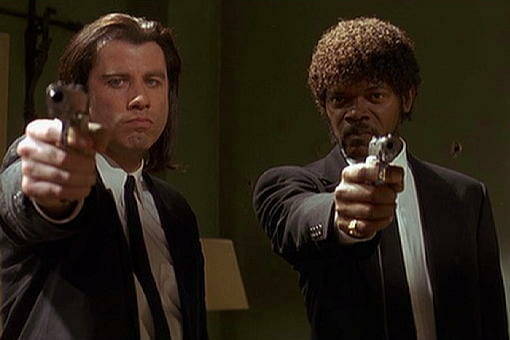
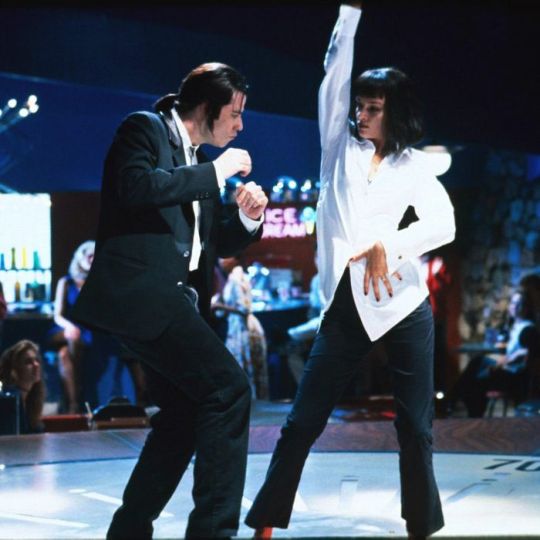
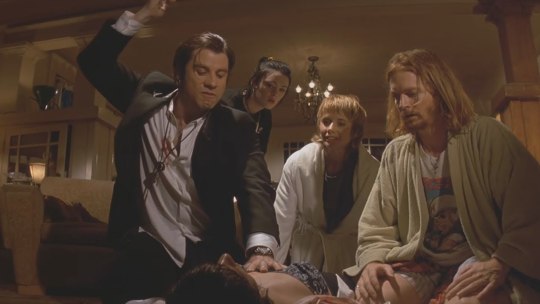
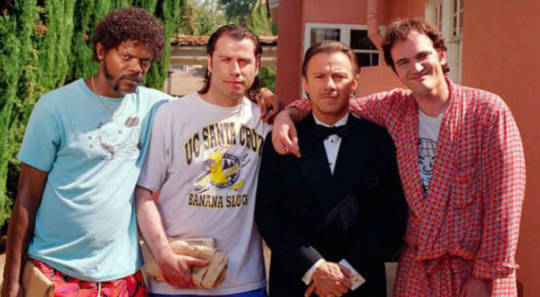
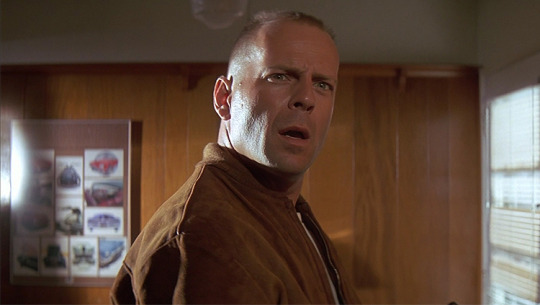
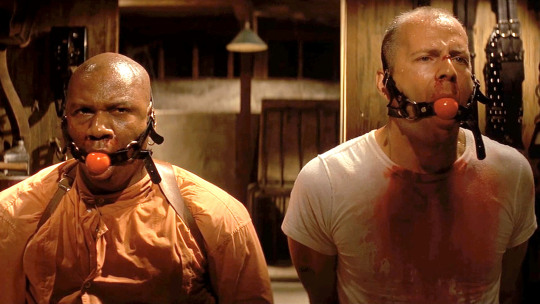
The most recent movie for review was the Quentin Tarantino crime thriller comedy (probably more things) Pulp Fiction (1994). It is a very complicated story that is told out of chronological order and focuses on scenes of meaningful character interaction. This confusion meant it lost out to movies with a more straight forward time line at the Oscars, since the move was nominated for seven awards but only took home one. The single win for best screenplay was well deserved and I still believe it is one of the most creatively written films of all time. I want to go over the plot to show what I mean, but let me do my standard due diligence:
SPOILER WARNING!!! I AM ABOUT TO GIVE THE BASIC DETAILS OF ONE OF THE MOST COMPLEX STORY LINES IN MOVIE HISTORY!!! IT WILL NOT LIKELY SPOIL MUCH OF ANYTHING, BUT I AM STICKING THIS WARNING ON JUST IN CASE SOMEBODY FINDS SOMETHING!!!
-------------------------------------------------------------------------
The film begins with what is pretty much a prologue but what turns out to be about the middle of the film chronologically. A couple is at a diner and they are talking about robbing banks. They only refer to each other as Pumpkin (Tim Roth) and Honey Bunny (Amanda Plummer). They discuss the best kind of places to rob and they decide that a diner would be a good change of pace. Impulsively, they pull out guns and hold up the diner and...title card with awesome spaghetti western music!
Two hitmen are talking about Europe as they go to do a job. Vincent Vega (Jon Travolta) talks about his adventures with Jules Winnfield (Samuel L. Jackson) as they pull up at an Los Angeles apartment complex. The two discuss their boss Marsellus Wallace and how touchy he is about his wife. The boss has apparently sent them to get something from a bunch of guys. Jules and Vincent call on an apartment with 3 college age men and intimidate them into giving over a briefcase with something glowing inside. The case is what they came for, so the hitmen take it and kill two of the men at the apartment...
Flash to a new scene in which Vincent is going to get some drugs from his dealer (Eric Stoltz). Vincent is a heroine user despite cocaine being the popular drug. It turns out Vincent was asked by his boss to take out his wife...the one he is very protective of. He just needs to hang out with her so she is not bored and not get into trouble. To accomplish this, he shoots up some heroine and goes to meet the wife named Mia Wallace (Uma Thurman). They seem to get along and he drives her to a restaurant called Jack Rabbit Slims. The place is fantastic, all the waiters are dressed up like American movie icons and the booths are repurposed cars from the 50s (if this place actually existed, you can be sure I would search it out and go there at least once). The two bond over dinner and then volunteer for a twist dance contest.
Mia and Vincent go back to her house and Vincent goes to the restroom to talk himself out of trying to score with Mia. She is pretty cool, but not worth dying for. While he is away, Mia finds some heroine in the pocket of Vincent’s jacket and thinks it is cocaine. She snorts it and immediately starts to overdose. Vincent panics and decides to drive her to the dealer’s house. The dealer has a nurse kit that comes with a giant needle full of adrenaline which Vincent stabs her with. She wakes up and Vincent takes her back home and is glad that he will live another day...
We jump to a flashback of a young boy who is has lost his father in Vietnam. An officer is visiting that has a gift. Apparently, there is a family watch that belonged to the boys great grandfather and had been passed down through the generations. His father had it when he was captured and gave it to the officer before the father died in the POW camp. The officer escaped and found the boy to give him the watch...
A boxer named Butch (Bruce Willis) wakes up from a dream. He is the boy all grown up. He is about to throw a fight for Marsellus Wallace (Ving Rhames), the same boss that everyone is afraid of. Butch does not throw the fight and accidently kills the other boxer. It turns out that he bet on himself and now he needs to get out of town before Marsellus Wallace catches him. He goes to a hotel where his rather dumb girlfriend is waiting for him. They go to bed and then are about to leave the next morning when it turns out that she forgot his watch. Butch freaks out and goes back to their old apartment to get the watch (note the very long take following Bruce Willis as he takes a back way to get to the apartment). Vincent is there waiting for him, but Vincent is in the bathroom and Butch is able to get a gun and kill Vincent as he is coming out of the bathroom. Things seem good so Butch drives off...
As Butch drives home, he sees Marsellus crossing the street in front of him so Butch hits the gas and runs down the boss but also hits an oncoming car. Both men are injured but Marsellus gains his senses and chases Butch into a shop where both are captured by a weird redneck with a shotgun. Butch and Marsellus are tied up in the basement of the shop and a man named Zed shows up. The shop owner has a gimp in a box (all leathered up and everything) and other fetish things downstairs. After a quick game to pick who goes first, they take Marcellus into another room to rape him. Butch manages to escape and is running away...but he decides can’t leave somebody to be assaulted like that. He grabs a weapon from the shop and kills the shop owner and frees Marsellus from Zed. Marsellus is not happy and says he will go “medieval” on Zed and allows Butch to leave town. Butch collects his girlfriend and leaves immediately...
Flash back in time (we know this because Vincent is alive) to right after Vincent and Jules shoot the guys with the case. Another guy in the other room jumps out and unloads six rounds at the two and misses every shot. The hitman kill that man, but Jules is shaken and decides to give up the business. They take a fourth gut with them in the car to go back to see Marsellus. On the drive over, Vincent accidently shoots the passenger while going over a pothole. The inside of the car is absolutely covered in blood and brains, so the two have to find a safe house. They go to the home of Jimmie (Quentin Tarantino) who will help them but says they have to get out in a couple of hours before his wife gets home. They call Marsellus, who sends over a cleaner named Wolf (Harvey Keitel). They are able to get everything cleaned up in time and leave with the car and the body. Jules and Vincent have to change out of their bloody clothes and decide to take a cab out to a diner for some food before seeing Wallace.
The two are at a familiar looking diner discussing whether their survival was a miracle and whether Jules should quit. Vincent goes off to the bathroom and, while he is gone, Pumpkin and Honey Bunny from the beginning declare it a robbery and it is evident that we have circled in time back around to the beginning. The couple hold up the diner, but, when they get to Jules, he takes Pumpkin hostage and devises a plan for everybody to leave. Jules allows the couple to leave alive with all the wallets, then the two hitmen follow quickly behind them before any police can show up.
---------------------------------------------------------------------------
I put a spoiler warning at the top, but there is so much to this film that there is no way you could spoil everything. I find new things to enjoy about this movie each time that I watch it and the watch count has to be at least two dozen times at this point. This film is so rich with allusion and homage to movies of the past that you might never see everything. Tarantino is truly a lover of old films and he worked every reference he could into this film. This is truly like candy for a cinephile.
I have, however, had a love hate relationship with this movie: I love this movie and I hate it when people tell me it is too violent. There was a lot of negative response to the films toxic masculinity, romancing crime culture, incredible amount of swearing, drug use, extreme gun violence, and very adult themes. There is a very famous interview between Quentin Tarantino and Jan Wahl in which she accuses him of using excessive violence and he tells her it is because it is a lot of fun to watch. His stylistically gory violence stems from exploitation films of the past and there is an established audience that enjoys it. He makes his movies for himself and this group of people.
Kind of like the comedy of Eddie Murphy, Richard Pryor, and George Carlin, you have to wade through a sea of swearing to find the comedic banter. The things that Jules and Vincent say to each other are some of the funniest stuff I have ever heard, but you really have to pay attention. Their attempts to express their feelings while maintaining their hard exterior persona is ridiculous. This is probably why many people enjoy the scenes with Vincent and Mia: there is a lot more courtesy which reduces the tirade of cursing.
The violence is very very over the top, but it is no where near the level of gore that Tarantino has become known for over the years. I must admit that he likes his torture scenes and this film is no exception. I would like to note how clever the torture scene with Butch and Marsellus is because they are both tied up and facing camera so only the audience can see the mischief that is being prepared behind them.
The soundtrack for the film is well worth mentioning as it also pays homage to 50s, 60s, and 70s exploitations films. There is a lot of silence in the film with sudden bursts of fast paced music that help with transitions. Most famous is the intro music after diner prologue, a surf rock classic by Dick Dale and The Del Tones called Misirlou. It is pure speed guitar riff along the lines of Wipeout and transitions the scene perfectly. Take a listen for yourself:
https://www.youtube.com/watch?v=ZIU0RMV_II8
Maybe the biggest thing about this film and Tarantino in general is the inspiration of the slick gangster dialogue. There had been a push for more melodramatic dialogue or the complete absence of much talking. Tarantino added in this slick, fast moving comedic dialogue that is said over extreme violence and adult situations. Marsellus Wallace talks about having some crack heads torture a man to death immediately after being raped in a basement. The hitmen talk about appropriate manners while cleaning out brains from the back of a car. Jules talks about the meaning of the bible during a robbery. Everything seems out of place in the real world but perfectly acceptable in Tarantino’s world. This is probably why I have no problem with the violence in the film.
So should this film be on the AFI top 100? Absolutely. It is an homage to film history while simultaneously introducing a sub genre that mixes current dialogue and exploitation touches to grindhouse action. It is fascinating and fun. Would I recommend this movie? If you are old enough. I can’t emphasize enough how fun I find this film, but I cannot deny that it is filled with adult situations like drug usage followed by driving, secret dungeon rape, and cold blooded murder with no consequences. If you can differentiate between Tarantino’s world and the real world, then this is great. If you can’t, then maybe try something else with slick dialogue like Butch Cassidy and the Sundance Kid.
#miserlou#pulp fiction#samuel l jackson#Quentin Tarantino#john travolta#violence#action#90s movies#academy award winner#dialogue#cinematography#introvert#introverts
20 notes
·
View notes
Text
“Conventional Weapons” and the Rocky Road to “Danger Days”
In 2009, My Chemical Romance was buzzing with activity. The band performed several shows and festivals (including Summer Sonic in Japan), Gerard and Mikey Way attended San Diego Comic Con, and The Umbrella Academy was named one of Amazon’s top comics of 2009. Ray Toro held a Whopper eating contest on the official MCR website (no joke), while a certain comic series written by Gerard Way and Shaun Simon was announced in August. And at a show at the Roxy in Los Angeles, MCR performed three new songs from their upcoming album.
But while their next album seemed easily slated for an early 2010 release, MCR was about to hit a series of hurdles that would leave them with a scrapped album, a lost drummer, and a totally new outlook on where their music was headed.

On July 31st, 2009, MCR performed a set at the Roxy that included three new songs–“Kiss The Ring,” “The Drugs,” and “Death Before Disco.” Gerard was enthusiastic about the new tracks, even telling Rolling Stone that “Death Before Disco” was “the greatest song we’ve ever written.” Videos of the tracks soon appeared online, where fans eagerly devoured what they thought would be the follow-up to 2006’s The Black Parade.
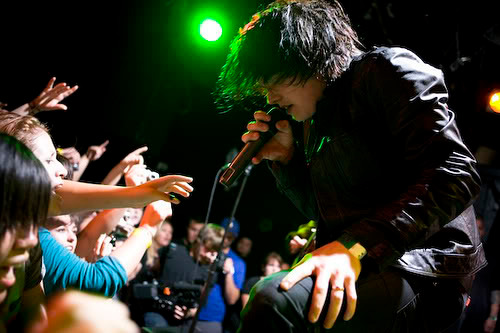
As the days and weeks went on, the media blitz kicked into high-gear. While Ray Toro posted short studio clips on MCR’s website, the band gave several interviews where they gushed about producer Brendan O'Brien, discussed their new stripped-down style, and claimed that this would be their best record yet. In an interview with MTV, Gerard described the still-untitled album as a “true love letter to rock and roll,” adding:
“There’s something about being an American rock-and-roll band that we’ve kind of grown into and we’re very proud of. And I think that’s what we’re celebrating with this record. There’s no agenda, there’s no mission; it’s just about rock and roll.”
Meanwhile, Gerard Way and close friend Shaun Simon had another surprise in store: a comic series called "Killjoys.” Dark Horse Comics announced the release at San Diego Comic Con. Jeremy Atkins, the Dark Horse Director of Public Relations, described “Killjoys” as “a psychedelic rock-and-roll road trip adventure geared toward both fans of The Umbrella Academy and My Chemical Romance.” But not much else was said about the comic, as MCR’s upcoming album had become Gerard’s top priority.
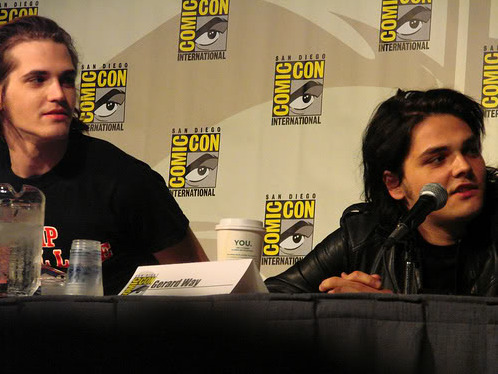
As the album drew closer to completion, MCR gave fans more glimpses of what lay in store. They shared the titles of various tracks, including “Still Alive,” “Trans Am,” “Hail To The King,” “Save Yourself, I’ll Hold Them Back," “L.A. Heavy,” "The Only Hope For Me Is You,” and “Black Dragon Fighting Society.” They cited a variety of influences, including Queen, Judas Priest, Bruce Springsteen, The Killers, and Blade Runner. By all accounts, this was going to be MCR’s defining album.
In December, MCR previewed seven tracks for SPIN magazine. A month later, in January of 2010, the album–which was still untitled–was rumored to be released on March 30th. As they continued to rework the songs, they realized that the stripped-down sound wasn’t working. As NME reported in January:
Things turned around with a song called “Trans Am,” now renamed "Bullet Proof Heart,” the likely first single. And perversely, they did it by returning to fiction. Broadly, it’s about a boy in New Jersey, dressed in a Judas Priest T-shirt, called Johnny. And a girl called Jenny who might be his girlfriend, but who also (honk the pop fact sirens!) might also be the missing girl from “Jenny Was A Friend Of Mine” by The Killers.

But in the same interview, Gerard restated that the album would give "the purest, best version of the band you could ever hope for.” And in early February, MCR finally started to wrap up production, telling Big Cheese that the album would probably be released in spring or summer.
“Killjoys” also looked promising–back in January, Scott Allie had reported in a blog post that Shaun Simon and Becky Cloonan were ready to get started. Once Gerard wrapped up the album and finished working on the Umbrella Academy movie screenplay, it seemed like he’d be ready to dive in.
But February was also when the band publicly stumbled for the first time.

Before the Big Cheese interview, MCR had abruptly cancelled their appearance at the Soundwave festival in Australia. In a blog post on MCR’s website, Frank claimed that Gerard was having voice problems (he jokingly implied that it was due to coffee and cigarettes) and required treatment to make a full recovery.
Fans were disappointed, but most understood that it couldn’t be helped. But a month later, the fandom received another shock: MCR’s drummer Bob Bryar had departed the band. In another blog post, Frank told fans:
As of 4 weeks ago, My Chemical Romance and Bob Bryar parted ways. This was a painful decision for all of us to make and was not taken lightly. We wish him the best of luck in his future endeavors and expect you all to do the same. We also wanted to give you all a quick heads up on how the record is progressing. We have been writing some very powerful new songs so this week the four of us entered the studio once again, and what has been ending up on tape each night is some of the most exciting and honest work we have ever created.
The fandom was stunned. Clearly, MCR had been experiencing some behind-the-scenes turmoil, suggesting that the process wasn’t going as smoothly as fans had thought. While it wasn’t known at the time, they also parted ways with producer Brendan O'Brien, who had been hired specifically to channel their raw, back-to-basics sound. Where would MCR go from here? And when would fans hear the latest album–which was apparently undergoing rewrites once again?
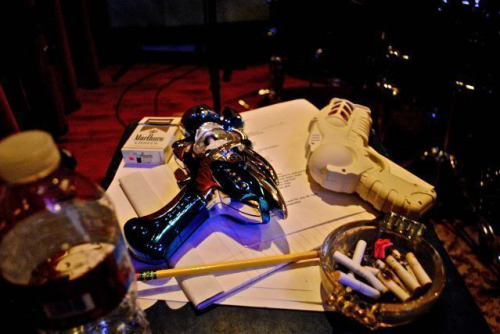
It wasn’t until late 2010 that fans would finally learn what had happened to this unreleased album.
This moment, says frontman Gerard Way, looking back on what went wrong, “was the hardest part”. Guitarist Ray Toro was “home dealing with some family things”, leaving Way, his bassist brother Mikey, and guitarist Frank Iero alone in the mixing studio. “The sinking feeling was really starting to become loud that it wasn’t right - that the record wasn’t finished, I couldn’t even put them in a track order … "Thinking about it now, it’s kind of upsetting, because I just felt so lost,” Gerard says.
This was discussed in an interview with Herald Sun, where they talked about the process of starting again after the departure of their drummer and producer. Speaking to Music Radar, Ray Toro talked about the struggles the band had with original producer Brendan O'Brien, admitting that it hadn’t gone as well as they once thought:
“He was really trying; he did the best he could with us. He knew things weren’t clicking, and he’d try to rally us. I remember he said, ‘Hey, on some songs, I’d love to hear you do what you did on The Black Parade.’ Because there wasn’t any of the harmonized guitar parts or the stacking that I usually do. He was trying to get us to make one record, and we wanted to make something totally different.
Musically, we wanted to go back to our basement. But just because we wanted to do something different didn’t make it easy. In many ways, we felt as though we were holding ourselves back creatively. We were going through the motions. Some of the songs were good, but we weren’t happy with all of them.”
Needing a break, Gerard took a vacation to the desert that surrounded Los Angeles. There, as he told Terminal 5, he realized “I had started the band after 9/11 when I hated art. Black Parade had been about hiding and punishment. I couldn’t tell the truth so I’d talk about cancer instead. I had to put on a mask to show people who I really was. But now it was time to own it. To be who I was before this band started. And I had something in my back pocket: this song, ‘Na Na Na.’”

Reunited with producer Rob Cavallo, who had worked on The Black Parade, the band kicked things off with “Na Na Na.” Gerard and Shaun Simon’s comic “Killjoys,” once a separate side project that had nothing to do with the band, suddenly became the concept that they formed the album around. Fueled by fresh creative energy, the band wrote and re-wrote tracks, came up with concepts and characters like Dr. Death Defying, and shredded the limitations that had confined them. At one point, Gerard turned to his brother Mikey and said “Danger Days, here we come again!”
Not everything from the previous record was scrapped. “Trans Am” became “Bulletproof Heart”; “Death Before Disco” became “Party Poison.” A few new versions of old tracks appeared on the record, as well as the Mad Gear and Missile Kid EP that came later. But MCR’s fourth album had gone from a rock and roll record that deliberately avoided ambitious storylines, to a vividly realized concept album that invited fans into the world of post-apocalyptic California. In many ways, it was the opposite of what they had originally planned. And it seemed to be exactly what they had been looking for.

During this time, Frank snapped in-studio photos that he sold on MCR’s official website, offering one-of-a-kind peeks into the recording process. In March, Mikey Way stated in a blog post that “One day you will wake up, and nothing will ever be the same again, but it’ll feel like an old friend.” He was talking about upcoming changes to the MCR website, but in a way that statement reflected the band’s process at the time–they had completely reinvented themselves, and yet there was still a certain familiarity in the old tracks they had revamped.
The band completed the album with fresh energy, offering sporadic updates in the coming months. Fans waited with some skepticism to see what MCR had in store. And finally, one day in early September, MCR’s website disappeared and was replaced with a mysterious transmitter. The Danger Days era had begun.
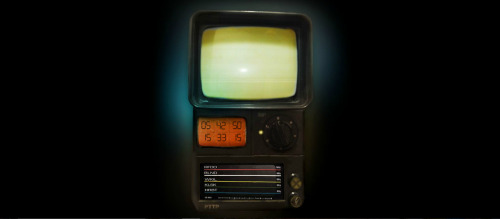
But was the scrapped album hidden away, never to be heard again? Not quite.
In 2012, in a blog post on MCR’s website, Frank talked about the feelings of depression that he had faced after The Black Parade. He felt like MCR had done it all, leaving them with nothing left to accomplish. In November 2008, Gerard called him up to talk about the band. As new ideas took shape, they prepared to start recording the album that would eventually be scrapped after months of work.
Frank pointed out that while the band had limited themselves during the recording of this album, the songs weren’t inherently bad–in fact, some of them were among his favorites that the band had produced. As time passed, he developed a greater appreciation for the tracks. And when the band met up and listened to those songs, they decided to release a selection of tracks to the public–two tracks a month for the next five months, for a total of ten.
After all this time, the album finally had a title: Conventional Weapons. Tracks included “Kiss The Ring,” “The World Is Ugly,” “Surrender The Night,” and the fan-favorite “The Light Behind Your Eyes.” Listening to the tracks, it was clear that MCR had aimed for a rock album with a pure American sound–no ambitious concepts or storylines, just a set of killer tracks. Whether they succeeded is up to the listener to decide, but they provided some insight into what came before Danger Days.
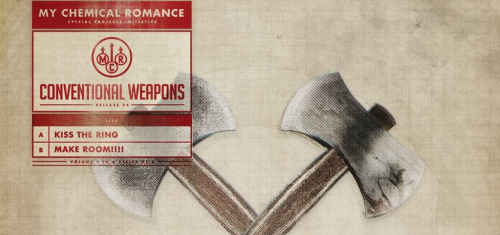
Due to its unconventional release, and the fact that the album was a series of random tracks and not a finished product, Conventional Weapons is not considered an “official” MCR album. But while Danger Days was the final album, Conventional Weapons was the final release before MCR broke up in 2013. Since the split, the release of CW has caused many fans to wonder–will My Chemical Romance’s fifth (and unreleased) album ever be shared in a similar fashion? Or will it be locked away forever, like the other CW tracks that were never released?
Only time will tell. But for now, Conventional Weapons serves as an intriguing part of MCR’s history–a time when the band set out to make one type of album, and ended up making the complete opposite.

(Picture credits: 1 2 3. Other in-studio photos by Frank Iero.)
[Originally published 07.09.2017]
#my chemical romance#mcr#gerard way#mikey way#ray toro#frank iero#conventional weapons#articles#music#behind the scenes#na na na#bulletproof heart#party poison (song)#killjoyhistory#reuploads
14 notes
·
View notes
Photo

introducing LEXI *:・゚✧*
* IMOGEN POOTS, FEMALE + SHE/HER | you know LEXI TAYLOR, right? they’re TWENTY-SIX, and they’ve lived in irving for, like, THEIR WHOLE LIFE? well, their spotify wrapped says they listened to DON’T STOP ME NOW BY QUEEN like, a million times this year, which makes sense ‘cause they’ve got that whole MIDNIGHT TRIPS THROUGH TOWN JUST TO ADMIRE THE NEON LIGHTS, A MILLION PROJECTS TO FINISH BUT CAN’T FIND HER FAVORITE PEN, AND MAKING OUT WITH STRANGERS IN THE BATHROOM OF THE ROLLER RINK thing going on. i just checked and their birthday is DECEMBER 10TH, so they’re a SAGITTARIUS, which is unsurprising, all things considered. ( michaela, 23, pst, she/her )
STATS.
full name: lexi jo taylor nicknames: lex, lo lo (from her mom) age: twenty-six. date of birth: december 10th, 1994. hometown: irving, nc. current location: irving, nc. gender: cis woman. pronouns: she/her. religion: none. occupation: filmmaker. orientation: chaotic bisexual relationship status: single for about a week residence: second story one bedroom in delphinus heights. education: high school diploma
PHYSICAL APPEARANCE.
hair color / style: bleached blonde, with her natural brunette roots growing in. messy waves, bangs. eye color: green. height: 5'4″. tattoos: canis lupus (fantastic mr. fox) on her inner right wrist, california wildflowers on her left ribcage. piercings: ring on right nostril, double lobes, had a navel but took it out a few years ago.
HEALTH.
allergies: most antibiotics. sleeping habits: rarely. likes to be out late, but can’t sleep past the sunrise. gets about 5-6 hours a night. eating habits: pretty healthy, a side effect of living in hollywood. makes unhealthy things healthier on accident, just because she has a love affair going on with veggies. lettuce wrapped burgers, vegetarian pizza, etc. no dairy, but only because she doesn’t like the feeling of it in her throat afterwords. exercise: she knows she should, but hates it. it’s so much work. she does love walks, but doesn’t consider them exercise. sociability: likes to distract herself with people. a big flirt with a heart of gold. addictions: working on not being an alcoholic, being the center of attention. drug use: occasional weed, social lsd user. tried cocaine once at a party. alcohol use: yes.
PERSONALITY.
positive traits: generous, determined, imaginative, warm-hearted, romantic, artistic, energetic, spontaneous, adventurous negative traits: rash, self-centered, indulgent, dramatic, detached, flighty, candid, messy fears: failing, her mother dying hobbies: theatre, singing, playing guitar habits: picking at skin around fingernails, binge drinking, fidgeting
PLAYLIST.
sober ( childish gambino ), talk too much ( coin ), wheel in the sky ( journey ), dinner and diatribes ( hozier ), if you’re too shy [let me know] ( the 1975 ), no. 1 party anthem ( arctic monkeys ), i know the end ( phoebe bridgers ) 4ever! ( lany )
TYPES.
zodiac sign: sagittarius. mbti: enfp. enneagram: 7. temperament: sanguine. moral alignment: chaotic good. primary vice: lust. primary virtue: charity.
CHARACTER INSPO.
lady bird ( lady bird ), suzy bishop ( moonrise kingdom ), shawn hunter ( boy meets world ), jess mariano ( gilmore girls ), erin quinn ( derry girls )
BULLET POINT BIO.
she was raised by single mom after dad left when she was 11. her dad was cheating with her aunt (her mom’s sister) and when it was exposed, it was quite the town scandal.
lex is the youngest of five siblings. (pretty much) all of her siblings grew up to be successful in something practical, like doctors, engineers, etc.
grew into the “black sheep” role rather early on. a rebellious artist with a vulgar streak, lexi was never her mom’s favorite. she tried her best, and lexi knows now that she was hard to parent, but she still hold resentment in her heart for the mom who always wanted perfection from her and never gave her room to breathe.
as a senior in high school, lexi would have done anything to get out of irving. her english teacher suggested she enter a screenplay contest, and she won. an indie production company picked up her first film, an adaptation of kate chopin’s the awakening, and she packed her bags and moved to los angeles without a second thought. she told very few people where she was going, or that she was leaving at all, and only kept in contact with maybe one or two close friends.
she slowly began to gain popularity in the mainstream as her film began it’s wide release, but her relationship with a young movie star is what really put her on the map, or at least on the front page of the tabloids. lexi and her boyfriend were one of hollywood’s “it” couples for two years, until it was exposed that he had been cheating on her with his costar.
on the same night her second film, a thinly veiled coming-of-age story about her life in irving, was nominated for this year’s academy awards, her now ex-boyfriend kicked her out of their shared apartment with nothing but a suitcase to her name.
having nowhere else to go, lexi flew home and has been hiding out in irving for about a week. she’s trying to avoid anyone she knew from before she moved, terrified to find out how they felt about their portrayal in her movie.
HEADCANONS.
i imagine her to be about as famous as greta gerwig. like, you’d know her if you were into movies but some rando on the street isn’t going to recognize her.
she had brunette hair before she left and dyed it blonde when she moved to hollywood, so anyone who knew her from before would notice that haha.
she was a 2014 tumblr girl and still listens to the same music she did in high school.
she grew up undiagnosed with ADHD and was formally diagnosed in la. she did okay in school but only really excelled in her english classes.
big theatre nerd. her favorite musical is spring awakening.
super hopeless romantic. falls in love with pretty much everyone she meets. loves hookups, but then spends the next week daydreaming about what they could have been if they lasted longer than one night.
was more of a grunge loner in high school, but is a big party animal now.
#irvingintro#i have more for her (esp. wanted connections!) but I wanted to get this out before the 24 hours was up haha
10 notes
·
View notes
Text

『 adam brody. forty. cis male. he/him. 』 oh heavens, is that DANIEL ABRAMS from FAIR LANE i see roaming around mapleview? minnie may’s always calling them -BROODING & -EVASIVE. i happen to think they’re not that bad! they’re a pretty cool HORROR AUTHOR and every time i’ve seen them, they’ve always been +DEBONAIR & +ELOQUENT. i hope i see them around again!
classically rolls in ridiculously late bc i forgot i had to work last night & then proceeded to sleep in today wooo !! good afternoon ghouls, it’s ya girl maia, finally here to deliver the definition of hot mess with good intentions.
GENERAL
FULL NAME. daniel elijah abrams.
NICKNAMES. dan, danny.
AGE & BIRTHDATE. 40 years old ; may 4, 1980.
GENDER & PRONOUNS. cis male ; he/him.
ORIENTATION. heterosexual.
MARITAL STATUS. estranged.
RELIGION. jewish ( non-practicing ).
OCCUPATION. horror author.
INSPIRATION. bill denbrough ( it ), donnie darko ( donnie darko ), lucas scott ( one tree hill ), stephen king.
PHYSICAL
HAIR COLOUR. black.
EYE COLOUR. dark brown.
BUILD. athletic.
MARKS. freckles scarcely spread across his entire body.
TATTOOS. none.
PIERCINGS. none.
HEIGHT. 5'11".
FACECLAIM. adam brody.
PERSONALITY
ZODIAC. taurus.
ALIGNMENT. chaotic neutral.
HOGWARTS. ravenclaw.
LABEL. the arcane.
POSITIVE TRAITS. cheeky, debonair, driven, eloquent, resilient, solicitous.
NEGATIVE TRAITS. brooding, evasive, inquisitive, sarcastic, stoic, stubborn.
HOBBIES. smokes like a chimney while writing until he forgets what day of the week it is, dabbles in hunting & fishing (thanks @ his dad), labels all crime / thriller genres as ‘predictable’ but continues to watch them, obsesses over & relentlessly criticizes his own work, drinks heavily & passionately plays moonlight sonata or fur elise as if he’s betoven’s disciple.
BACKGROUND
PLACE OF BIRTH. california.
CURRENT RESIDENCE. mapleview, north carolina.
NATIONALITY. american.
ETHNICITY. ashkenazi jewish.
PARENTS. judith miller & mr abrams.
SIBLINGS. mia miller.
BIRTH ORDER. eldest.
CHILDREN. penelope abrams.
EDUCATION. university of california, los angeles; bachelor of arts in english.
LANGUAGES. english, some spanish & french.
HISTORY
EARLY LIFE. born to THE judith miller and some newspaper editor, daniel was raised by the latter and notoriously abandoned by the former. well, not completely abandoned - there’s an old shoebox containing a few letters as proof - but that was the only source of communication in their otherwise absent relationship. while little danny boy didn’t fully understand why he couldn’t see his mother, he sought out an alternative solution by watching her movies. his father wasn’t aware, at first, and dan created this extravagant fantasy of the person he thought she was based on the roles she played. however, once papa abrams found out his son was watching these movies (which were probably not fit for children in the first place lmao oop), he begrudgingly revealed the bitter truth. being forced to come to terms with the fact that his own mother willingly abandoned him with his father, daniel didn’t fully understand what it meant; he couldn’t properly process why. the hurt of absent mother was expressed more out of anger, feeling as though there must have been something wrong with him. there were fewer and fewer letters sent to judith until he gave up altogether and thus, dan’s out of control behavior was born.
TEENAGE FEVER. SUICIDE MENTION TW. he struggled in school. his emotions betrayed him. instead of relishing a happy childhood, daniel found himself pushing everyone away, getting into fights, sneaking out late at night to run around the city streets with his friends and get into all sorts of trouble with them. he couldn’t count on his hands how many times the police picked him up and brought him to his dad’s doorstep. it only got worse once one of his best friends was found dead, written off as a suicide, though it didn’t add up in dan’s eyes and seemed so much more sinister. the young man was nearly deemed to be a lost cause, until he discovered his passion for writing.
language arts or literature was the last thing anyone would ever think to group with daniel abrams. but his english teacher noticed how well he could articulate his thoughts and feelings on paper, and submitted one of his pieces to a writing contest, which earned dan the win and a cash prize. bewildered by a talent he hadn’t even realized was in him, daniel embraced it. he started writing in a journal ( which he kept safely tucked away beneath the mattress of his bed ), documenting every feeling and thought as a way to express his emotions in a more productive manner. this talent earned him a full ride scholarship to ucla with a major in literature and plans of diving into some sort or creative writing career or perhaps becoming an english teacher, to follow in the footsteps of his high school teacher who he came to idolize.
mere days into his freshman year, however, his high school sweetheart showed up in the middle of the night at his dorm with a positive pregnancy test. it was then the chaotic world as he knew it turned a new leaf, revealing a silver lining in the form of their daughter, penelope, who daniel hadn’t a clue, just yet, would save him. and so a shotgun wedding was quickly planned around the pair, both families either completely supportive or in utter disbelief. it was quick, it was cheap(ish), and it was stressful as all heck. but they were young, and in love, and were looking forward to starting a family together, despite it being a little earlier than initially planned.
“ADULT”HOOD. fast forward five years, and they’re signing divorce papers. fortunately, it wasn’t messy. the two had simply grown apart as they matured in their respective ways, and remaining together was only causing a rift to develop between the two. the last thing they wanted, for the sake of their daughter, was built up resentment to tear the little family apart. his wife, who daniel initially thought to be the love of his life, blossomed into an absolute goddess; she was ambitious and knew exactly what she wanted. daniel, on the other hand, was still somewhat caught up in his ‘bad boy’ habits of drinking excessively and his career was still pretty up in the air. the two just didn’t compliment each others’ lifestyles anymore.
daniel moved out but remained in california, settling for a bachelor’s apartment where he was able to have penelope every weekend. during this time, he finally cracked down and worked on finishing a novel he’d started years prior. within a year, he found a publisher who took interest in his grotesque works, and by the time daniel was twenty seven, his first bestseller hit the shelves, changing his life for the better with the ability to provide for his daughter without stress of landing another odd job ever again.
as his fame increased, so did his desire to slink back into the shadows away from the limelight. at first, he enjoyed the wholesome book signings by day and grungy celebratory benders by night. but it grew old pretty fast and he certainly didn’t want to end up as another washed up shmuck. so, on a whim, daniel decided to move out of california completely, removing himself from the toxic lifestyle he’d grown accustomed to and shacking up on a beautiful piece of land in the rocky mountains of north carolina. the serenity and scenery certainly aided in his inspiration, as well as his unacknowledged lowkey addictions slowly being rehabilitated from his bloodstream.
OLD YELLER. now, in his utmost prime at forty years old, he’s written numerous cult classics, a few of which have successful movie adaptations. he was lucky enough to land himself in a second marriage, though.... that one is now deteriorating as well because he literally doesn’t know how to maintain a healthy relationship. he received full custody of his daughter when she was sixteen, under the unfortunate circumstance of her mother’s untimely death. although they’d been separated for nearly twenty years, daniel was still very much affected by the loss, more so empathetically for penelope. he’s still hooked on the drink, though he’s definitely calmed down quite a bit from when he was a young buck. basically a messy, depressy old soul who uses sarcasm to deflect his true feelings.
CONNECTIONS
ESTRANGED WIFE. first marriage was a bust, and the second is turning out to be no better. they haven’t hit rock bottom just yet, in his opinion (which would be finalizing a divorce lmao), and he’s unsure if they should work things out or not but also really.......doesn’t wanna go through the process of another divorce. plus he likes her and deep down adores their bickering. the reason(s) why things started falling apart between them can be discussed of course. lowkey debating on whippin this up as a big official wc but.... if anybody already here would like to snag it, i would 100% mclove it.
COLLABORATORS. literally anyone he’s worked with over the years, whether they be fellow authors, publishers/publicists, journalists, screenplay writers, etc. yeehooo the possibilities are endless !!
FOLLOWERS. anyone hooked on his books, whether devout fans from his early beginnings or people who newly discovered his fictional writings.
FORMER CLASSMATES. could be from high school or university, but he was in california for the better part of his life aka not a mapleview native. former friends to foes & anything in between. dan’s that one kid who spiked the punch bowl at all the dances and years later probably snuck in party favors to snort off the bathroom sink during their high school reunion lmao whew !!
ANYTHING. literally anything. i’m my groggy state of mind on my lack of creativity rn so please, i’m beggin. if daniel can enrich your characters’ lives in any way, shape, or form, hit me up and we’ll hatch a plan.
#———— 🥀 . 𝙳𝙰𝙽𝙸𝙴𝙻 𝙰𝙱𝚁𝙰𝙼𝚂 ╱ DOSSIER .#mv:intro#alcoholism tw#abandonment tw#drug use tw#mommy issues tw#suicide mention tw#i think....that covers it?? if i missed anything pls let me know & ill tag accordingly#this is awful bc i rushed a wee bit buT#HOT DOG am i stupid excited to write with yall
15 notes
·
View notes
Text
Oscarstippning 2021
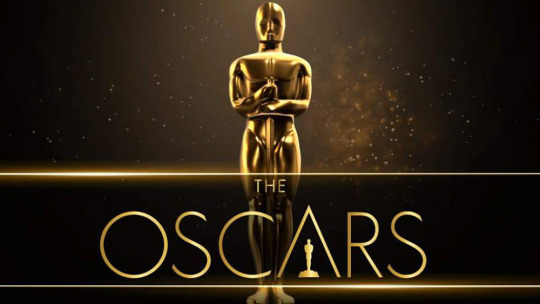
Sent omsider är det dags för årets Oscarsgala. Efter det kanske tuffaste året någonsin för filmbranschen råder det såklart andra förutsättningar än vanligt. Många filmer med planerad premiär under fjolåret har blivit framflyttade, och möjligheten att uppleva de filmer som faktiskt har släppts har varit mycket begränsad. Att uppmärksamma bra filmer känns därför viktigare än någonsin.
Oscarsgalan är den 93:e i ordningen. Den kommer, precis som föregående två år, inte ha någon enskild värd. På grund av omständigheterna kommer galan att hållas på både Dolby Theatre och Union Station i Los Angeles samtidigt. Exakt på vilket sätt återstår att se, men galans producenter har sagt att »the plan is to stage an intimate, in-person event at Union Station in Los Angeles, with additional show elements live from the Dolby Theatre in Hollywood.«
I vanlig ordning har jag tippat samtliga kategorier – vinnare i fetstil.
Best Picture
“The Father” (David Parfitt, Jean-Louis Livi and Philippe Carcassonne, producers)
“Judas and the Black Messiah” (Shaka King, Charles D. King and Ryan Coogler, producers)
“Mank” (Ceán Chaffin, Eric Roth and Douglas Urbanski, producers)
“Minari” (Christina Oh, producer)
“Nomadland” (Frances McDormand, Peter Spears, Mollye Asher, Dan Janvey and Chloé Zhao, producers)
“Promising Young Woman” (Ben Browning, Ashley Fox, Emerald Fennell and Josey McNamara, producers)
“Sound of Metal” (Bert Hamelinck and Sacha Ben Harroche, producers)
“The Trial of the Chicago 7” (Marc Platt and Stuart Besser, producers)
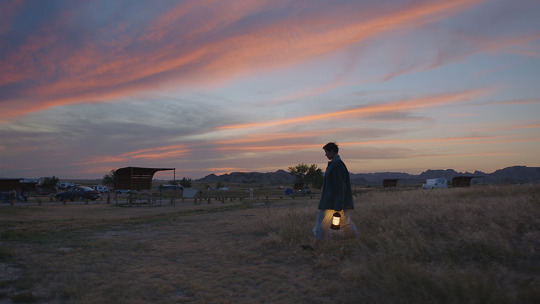
David Finchers »Mank« är galans mest nominerade film (tio stycken) men favoritskapet i den största kategorin ligger hos Chloé Zhaos lågmälda neo-Western »Nomadland«, med vinster på Producers Guild Award (PGA), Directors Guild Award (DGA), BAFTA och Golden Globe.
Det enda som talar emot »Nomadland« är vinsten för »The Trial of the Chicago 7« på Screen Actors Guild Awards (SAG). Det är ett pris som historiskt sett har korrelerat starkt med vinnaren för Bästa Film på Oscarsgalan – främst på grund av att skådespelare är den största röstande grenen inom Akademin. Faktum kvarstår dock att »Nomadland« inte ens nominerades för Best Ensembe (som är motsvarande Best Picture på SAG) eftersom filmen inte har någon ensemble, utan drivs av Frances McDormands ensamma huvudkaraktär.
De som utmanar närmast efter »The Trial of the Chicago 7« är »Minari« och »Promising Young Woman«. De senaste åren har som bekant bjudit på flera skrällar (»Moonlight« och »Parasite«), och därmed är kampen långt ifrån avgjord, men i år känns inte utmanaren lika tydlig. Aaron Sorkin misslyckades med att landa en nominering för bästa regi för »The Trial of the Chicago 7«, och momentum för »Minari« och »Promising Young Woman« känns inte tillräckligt starkt för att lyckas hela vägen. Själv har jag endast haft möjlighet att se fem av de åtta nominerade (ej sett »The Father«, »Minari« eller »Sound of Metal«). De jag har sett har hållit hyfsad jämnhög kvalitet, utan att riktigt nå hela vägen.
Best Director
Thomas Vinterberg (“Another Round”)
David Fincher (“Mank”)
Lee Isaac Chung (“Minari”)
Chloé Zhao (“Nomadland”)
Emerald Fennell (“Promising Young Woman”)
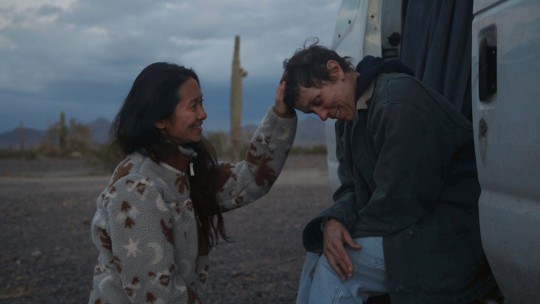
Oavsett om »Nomadland« går hela vägen eller ej så tror jag att Chloé Zhao står mer eller mindre ohotad för sin regi. Vid vinst blir hon blott den andra kvinnan i filmhistorien (efter Kathryn Bigelow för »The Hurt Locker«) att lyckas med det.
Best Actor in a Leading Role
Riz Ahmed (“Sound of Metal”)
Chadwick Boseman (“Ma Rainey’s Black Bottom”)
Anthony Hopkins (“The Father”)
Gary Oldman (“Mank”)
Steven Yeun (“Minari”)
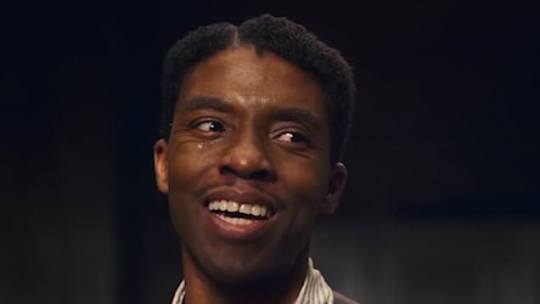
Om Hopkins skulle ta hem det vore han som 83-åring den äldsta vinnaren i kategorin någonsin. Riz Ahmed skulle vara den första muslimska mannen. Allting talar dock för Chadwick Boseman, som endast 43 år gammal gick bort i cancer i augusti i fjol.
Best Actress in a Leading Role
Viola Davis (“Ma Rainey’s Black Bottom”)
Andra Day (“The United States v. Billie Holiday”)
Vanessa Kirby (“Pieces of a Woman”)
Frances McDormand (“Nomadland”)
Carey Mulligan (“Promising Young Woman”)
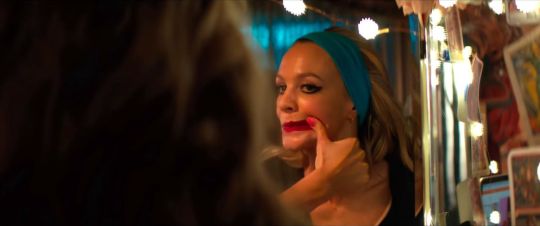
Förmodligen galans mest öppna kategori på förhand, då samtliga fem har vunnit priser under galasäsongen. Vanessa Kirby kan sannolikt räknas bort men övriga fyra har alla reella chanser. Andra Day tror jag dock faller bort på grund av att filmen inte är lika populär (och därmed sedd) som de övriga. Vidare har Frances McDormand redan belönats med två Oscars tidigare, den senaste för bara tre år sedan. Även Viola Davis har varit en återkommande favorit hos Akademin. I »Ma Rainey’s Black Bottom« spelar hon en fysisk och utagerande roll, vilket brukar premieras i sammanhanget. Min röst faller dock på Carey Mulligan. Hon har inte nominerats sedan genombrottet i »An Education« för elva år sedan, men är en personlig favorit med starka roller i bland annat »Drive«, »Inside Llewyn Davis« och »Shame«. Hennes roll i »Promising Young Woman« är en av årets mest debatterade – förmodligen på både gott och ont.
Best Actor in a Supporting Role
Sacha Baron Cohen (“The Trial of the Chicago 7”)
Daniel Kaluuya (“Judas and the Black Messiah”)
Leslie Odom Jr. (“One Night in Miami”)
Paul Raci (“Sound of Metal”)
Lakeith Stanfield (“Judas and the Black Messiah”)

Allt pekar på att Kaluuya kraftfulla gestaltning av Fred Hampton räcker för vinst. Hans största risk är förmodligen att Stanfield är nominerad i samma kategori för samma film, vilket skulle kunna »stjäla« röster från Kaluuya, men det ska mycket till.
Best Actress in a Supporting Role
Maria Bakalova (‘Borat Subsequent Moviefilm”)
Glenn Close (“Hillbilly Elegy”)
Olivia Colman (“The Father”)
Amanda Seyfried (“Mank”)
Yuh-jung Youn (“Minari”)

Glenn Close har tidigare aldrig vunnit en Oscar, trots sju nomineringar. Så sent som 2019 var hon favorittippad för sin roll i »The Wife« men föll på målsnöret mot Olivia Colman. En slags hedersoscar vore därför inte otänkbart, men givet den relativit anonyma filmen hon är nominerad för tror jag inte det kommer hända. Bisarrt nog är Maria Bakalova en av favoriterna, men efter att SAG och BAFTA gått till Yuh-jjung Youn är det hennes statyett att förlora.
Best Animated Feature Film
“Onward” (Pixar)
“Over the Moon” (Netflix)
“A Shaun the Sheep Movie: Farmageddon” (Netflix)
“Soul” (Pixar)
“Wolfwalkers” (Apple TV Plus/GKIDS)

Ett annat år vore hyllade »Wolfwalkers« ett säkert bet, men »Soul« är en av Pixars bästa och mest kreativa skapelser på många år. Dessutom nominerad för ljud och musik.
Best Adapted Screenplay
“Borat Subsequent Moviefilm.” Screenplay by Sacha Baron Cohen, Anthony Hines, Dan Swimer, Peter Baynham, Erica Rivinoja, Dan Mazer, Jena Friedman, Lee Kern; Story by Sacha Baron Cohen, Anthony Hines, Dan Swimer, Nina Pedrad
“The Father,” Christopher Hampton and Florian Zeller
“Nomadland,” Chloé Zhao
“One Night in Miami,” Kemp Powers
“The White Tiger,” Ramin Bahrani

Best Original Screenplay
“Judas and the Black Messiah.” Screenplay by Will Berson, Shaka King; Story by Will Berson, Shaka King, Kenny Lucas, Keith Lucas
“Minari,” Lee Isaac Chung
“Promising Young Woman,” Emerald Fennell
“Sound of Metal.” Screenplay by Darius Marder, Abraham Marder; Story by Darius Marder, Derek Cianfrance
“The Trial of the Chicago 7,” Aaron Sorkin
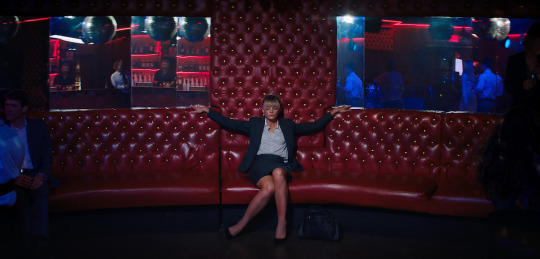
En duell mellan »Promising Young Woman« och »The Trail of the Chicago 7«. Personligen tycker jag att Sorkin har gjort mycket som är av betydligt högre kvalitet än »The Trial...«.
Best Original Song
“Fight for You,” (“Judas and the Black Messiah”). Music by H.E.R. and Dernst Emile II; Lyric by H.E.R. and Tiara Thomas
“Hear My Voice,” (“The Trial of the Chicago 7”). Music by Daniel Pemberton; Lyric by Daniel Pemberton and Celeste Waite
“Húsavík,” (“Eurovision Song Contest”). Music and Lyric by Savan Kotecha, Fat Max Gsus and Rickard Göransson
“Io Si (Seen),” (“The Life Ahead”). Music by Diane Warren; Lyric by Diane Warren and Laura Pausini
“Speak Now,” (“One Night in Miami”). Music and Lyric by Leslie Odom, Jr. and Sam Ashworth
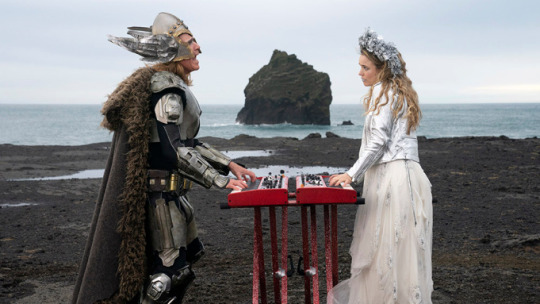
Om en låt från den filmen kan nomineras så kan den väl lika gärna vinna?
Best Original Score
“Da 5 Bloods,” Terence Blanchard
“Mank,” Trent Reznor, Atticus Ross
“Minari,” Emile Mosseri
“News of the World,” James Newton Howard
“Soul,” Trent Reznor, Atticus Ross, Jon Batiste

Trent Reznor och Atticus Ross är dubbelt nominerade och vinnare är förmodligen någon av dessa två filmer.
Best Sound
“Greyhound,” Warren Shaw, Michael Minkler, Beau Borders and David Wyman
“Mank,” Ren Klyce, Jeremy Molod, David Parker, Nathan Nance and Drew Kunin
“News of the World,” Oliver Tarney, Mike Prestwood Smith, William Miller and John Pritchett
“Soul,” Ren Klyce, Coya Elliott and David Parker
“Sound of Metal,” Nicolas Becker, Jaime Baksht, Michelle Couttolenc, Carlos Cortés and Phillip Bladh

Titeln skvallrar om var krutet har lagts. Allt annat än vinst vore ett misslyckande.
Best Costume Design
“Emma,” Alexandra Byrne
“Mank,” Trish Summerville
“Ma Rainey’s Black Bottom,” Ann Roth
“Mulan,” Bina Daigeler
“Pinocchio,” Massimo Cantini Parrini
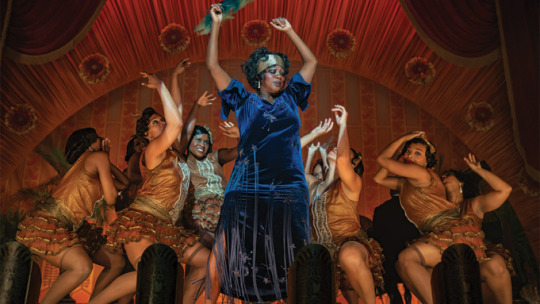
Best Animated Short Film
“Burrow” (Disney Plus/Pixar)
“Genius Loci” (Kazak Productions)
“If Anything Happens I Love You” (Netflix)
“Opera” (Beasts and Natives Alike)
“Yes-People” (CAOZ hf. Hólamói)

Best Live-Action Short Film
“Feeling Through”
“The Letter Room”
“The Present”
“Two Distant Strangers”
“White Eye”

Best Cinematography
“Judas and the Black Messiah,” Sean Bobbitt
“Mank,” Erik Messerschmidt
“News of the World,” Dariusz Wolski
“Nomadland,” Joshua James Richards
“The Trial of the Chicago 7,” Phedon Papamichael
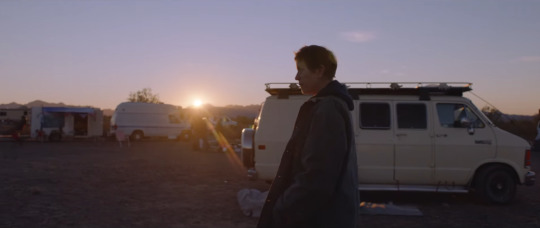
Best Documentary Feature
“Collective,” Alexander Nanau and Bianca Oana
��Crip Camp,” Nicole Newnham, Jim LeBrecht and Sara Bolder
“The Mole Agent,” Maite Alberdi and Marcela Santibáñez
“My Octopus Teacher,” Pippa Ehrlich, James Reed and Craig Foster
“Time,” Garrett Bradley, Lauren Domino and Kellen Quinn

Best Documentary Short Subject
“Colette,” Anthony Giacchino and Alice Doyard
“A Concerto Is a Conversation,” Ben Proudfoot and Kris Bowers
“Do Not Split,” Anders Hammer and Charlotte Cook
“Hunger Ward,” Skye Fitzgerald and Michael Scheuerman
“A Love Song for Latasha,” Sophia Nahli Allison and Janice Duncan

Best Film Editing
“The Father,” Yorgos Lamprinos
“Nomadland,” Chloé Zhao
“Promising Young Woman,” Frédéric Thoraval
“Sound of Metal,” Mikkel E.G. Nielsen
“The Trial of the Chicago 7,” Alan Baumgarten
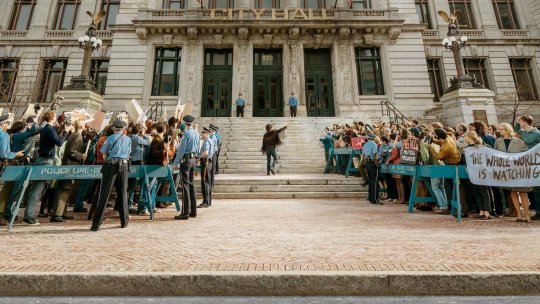
En stenhård duell mellan »Sound of Metal« och »The Trial of the Chicago 7«. Personligen har jag tyvärr inte hunnit se den förra än. Däremot kan jag konstatera att korsklippningen i den senare är helt central för filmens energi. Redan i filmens första minuter utnyttjas detta på ett effektivt sätt.
Best International Feature Film
“Another Round” (Denmark)
“Better Days” (Hong Kong)
“Collective” (Romania)
“The Man Who Sold His Skin” (Tunisia)
“Quo Vadis, Aida?”(Bosnia and Herzegovina)

Best Makeup and Hairstyling
“Emma,” Marese Langan, Laura Allen, Claudia Stolze
“Hillbilly Elegy,” Eryn Krueger Mekash, Patricia Dehaney, Matthew Mungle
“Ma Rainey’s Black Bottom,” Sergio Lopez-Rivera, Mia Neal, Jamika Wilson
“Mank,” Kimberley Spiteri, Gigi Williams, Colleen LaBaff
“Pinocchio,” Mark Coulier, Dalia Colli, Francesco Pegoretti

Best Production Design
“The Father.” Production Design: Peter Francis; Set Decoration: Cathy Featherstone
“Ma Rainey’s Black Bottom.” Production Design: Mark Ricker; Set Decoration: Karen O’Hara and Diana Stoughton
“Mank.” Production Design: Donald Graham Burt; Set Decoration: Jan Pascale
“News of the World.” Production Design: David Crank; Set Decoration: Elizabeth Keenan
“Tenet.” Production Design: Nathan Crowley; Set Decoration: Kathy Lucas
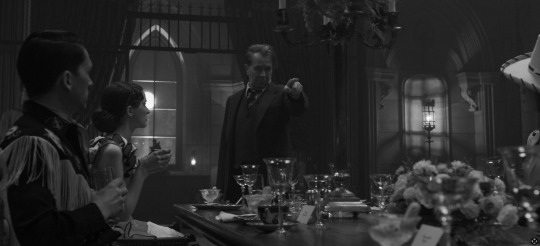
Best Visual Effects
“Love and Monsters,” Matt Sloan, Genevieve Camilleri, Matt Everitt and Brian Cox
“The Midnight Sky,” Matthew Kasmir, Christopher Lawrence, Max Solomon and David Watkins
“Mulan,” Sean Faden, Anders Langlands, Seth Maury and Steve Ingram
“The One and Only Ivan,” Nick Davis, Greg Fisher, Ben Jones and Santiago Colomo Martinez
“Tenet,” Andrew Jackson, David Lee, Andrew Lockley and Scott Fisher

Oscarsgalan sänds på TV4 från kl. 00:20 i natt.
2 notes
·
View notes
Text
Top 5 @Wikipedia pages from yesterday: Saturday, 9th December 2023
Welcome, tervetuloa, dobrodošli, vítejte 🤗 What were the top pages visited on @Wikipedia (9th December 2023) 🏆🌟🔥?

1️⃣: Ryan O'Neal "Ryan O'Neal (April 20, 1941 – December 8, 2023) was an American actor. Born in Los Angeles, he trained as an amateur boxer before beginning a career in acting in 1960. In 1964, he landed the role of Rodney Harrington on the ABC nighttime soap opera Peyton Place. It was an instant hit and boosted..."

Image by Wire photo
2️⃣: Animal (2023 film) "Animal is a 2023 Indian Hindi-language action drama film directed and edited by Sandeep Reddy Vanga, who also co-wrote the screenplay with Pranay Reddy Vanga and Saurabh Gupta. The film is produced by Bhushan Kumar, Krishan Kumar, Murad Khetani and Pranay Reddy Vanga under T-Series Films, Bhadrakali..."
3️⃣: Leave the World Behind (film) "Leave the World Behind is a 2023 American apocalyptic psychological thriller film written, directed and produced by Sam Esmail. It is based on the 2020 novel of the same name by Rumaan Alam. The film stars Julia Roberts (who also produced the film), Mahershala Ali, Ethan Hawke, Myha'la, and Kevin..."
4️⃣: Shane MacGowan "Shane Patrick Lysaght MacGowan (25 December 1957 – 30 November 2023) was an Irish singer-songwriter and musician best known as the lead vocalist and primary lyricist of Celtic punk band the Pogues. He also produced solo material and collaborated with artists including Joe Strummer, Nick Cave, Steve..."

Image licensed under CC BY-SA 2.0? by Masao Nakagami
5️⃣: Premier League "The Premier League is the highest level of the English football league system. Contested by 20 clubs, it operates on a system of promotion and relegation with the English Football League (EFL). Seasons typically run from August to May, with each team playing 38 matches against all other teams, both..."
0 notes
Photo

My original screenplay CRACKSMEN is a quarterfinalist in @thescriptlab’s Free Screenplay Contest! So happy to rise to the top of this round of 13,000 entries! On to the semis next month! Check it out here: https://bit.ly/CrkTSLFree! . In the past year, CRACKSMEN has also ranked in the @page_awards, @bigapplefilmfestival and @lascreenplayawards. A few years ago, CRACKSMEN made the top 20 percent for the @theacademy’s Nicholl Fellowship! . Now, someone please make this movie. . This wonderful poster art is by @artofant! . . . . . #sciencefictionart #cinephile #scifimovies #writersnetwork #cultmovie #biopic #aliens #filmfestival #filmcritic #films #writing #poet #sidneylumet #moviescenes #film #poets #scififantasy #cinema #writinglife #juliannemoore #screenwriter #filmbuff #writerscommunity #poetsofinstagram #writings #vintagescifi #screenwriting #screenplays #art #darkfuture (at Los Angeles, California) https://www.instagram.com/p/CC9mnkRFZ2O/?igshid=1drn357py1yff
#sciencefictionart#cinephile#scifimovies#writersnetwork#cultmovie#biopic#aliens#filmfestival#filmcritic#films#writing#poet#sidneylumet#moviescenes#film#poets#scififantasy#cinema#writinglife#juliannemoore#screenwriter#filmbuff#writerscommunity#poetsofinstagram#writings#vintagescifi#screenwriting#screenplays#art#darkfuture
1 note
·
View note